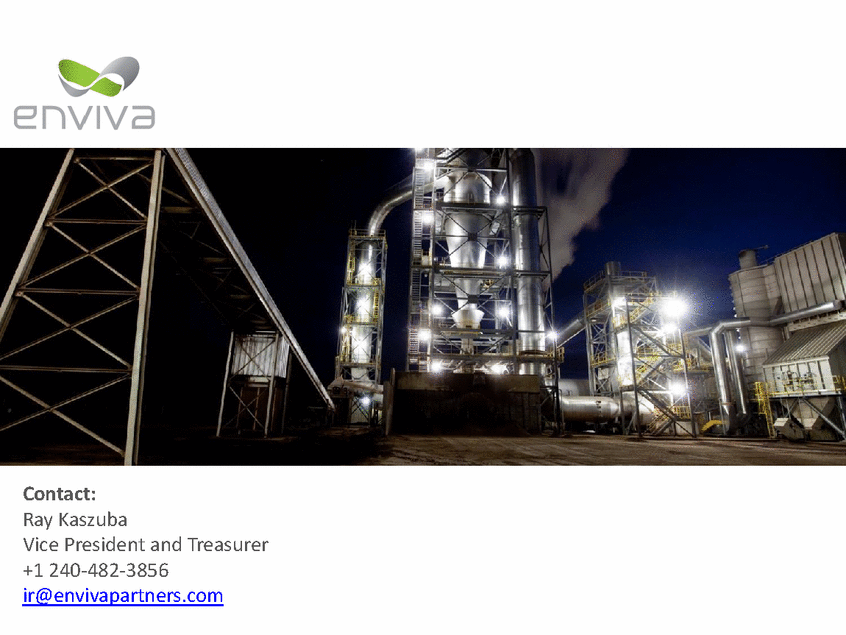Attached files
| file | filename |
|---|---|
| 8-K - 8-K - Enviva Partners, LP | a17-13114_38k.htm |
Exhibit 99.1
Enviva Partners, LP John Keppler – Chairman and CEO 2017 MLPA Investor Conference June 1, 2017
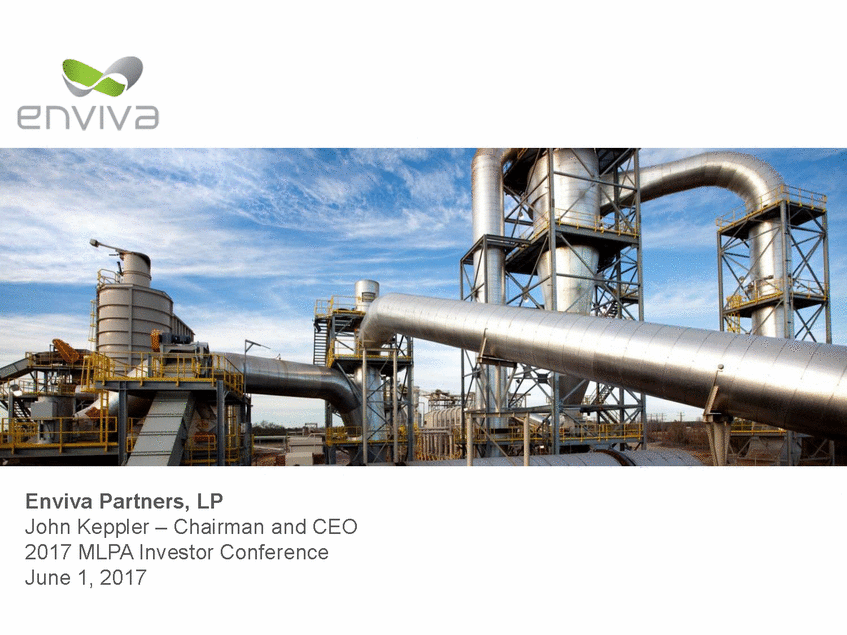
Forward-Looking Statements and Cautionary Statements Forward-Looking Statements This presentation contains “forward-looking statements” within the meaning of the securities laws. All statements, other than statements of historical fact, included in this presentation that address activities, events or developments that Enviva Partners, LP (NYSE: EVA) (“Enviva,” “we,” or “us”) expects, believes or anticipates will or may occur in the future are forward-looking statements. The words “believe,” “expect,” “may,” “estimates,” “will,” “anticipate,” “plan,” “intend,” “foresee,” “should,” “would,” “could,” or other similar expressions are intended to identify forward-looking statements, which are generally not historical in nature. However, the absence of these words does not mean that the statements are not forward-looking. These statements are based on certain assumptions made by Enviva based on management’s expectations and perception of historical trends, current conditions, anticipated future developments and other factors believed to be appropriate. Although Enviva believes that these assumptions were reasonable when made, because assumptions are inherently subject to significant uncertainties and contingencies that are difficult or impossible to predict and are beyond its control, Enviva cannot give assurance that it will achieve or accomplish these expectations, beliefs or intentions. A number of the assumptions on which these forward-looking statements are based are subject to risks and uncertainties, many of which are beyond the control of Enviva, and may cause actual results to differ materially from those implied or expressed by the forward-looking statements. These risks and uncertainties include the factors discussed or referenced in our filings with the Securities and Exchange Commission (the “SEC”), including the Annual Report on Form 10-K and the Quarterly Reports on Form 10-Q most recently filed with the SEC, including those risks relating to financial performance and results, economic conditions and resulting capital restraints, availability of sufficient capital to execute Enviva’s business plan, the ability of Enviva to complete acquisitions and realize the anticipated benefits of such acquisitions, impact of compliance with legislation and regulations and other important factors that could cause actual results to differ materially from those projected. When considering the forward-looking statements, you should keep in mind the risk factors and other cautionary statements in such filings. You are cautioned not to place undue reliance on forward-looking statements, which speak only as of the date on which such statement is made, and Enviva undertakes no obligation to correct or update any forward-looking statement, whether as a result of new information, future events or otherwise, except as required by applicable law. All forward-looking statements attributable to Enviva are qualified in their entirety by this cautionary statement. Industry and Market Data This presentation has been prepared by Enviva and includes market data and other statistical information from third-party sources, including independent industry publications, government publications or other published independent sources. Although Enviva believes these third-party sources are reliable as of their respective dates, Enviva has not independently verified the accuracy or completeness of this information. Some data is also based on Enviva’s good faith estimates, which are derived from its review of internal sources as well as the third-party sources described above. 2
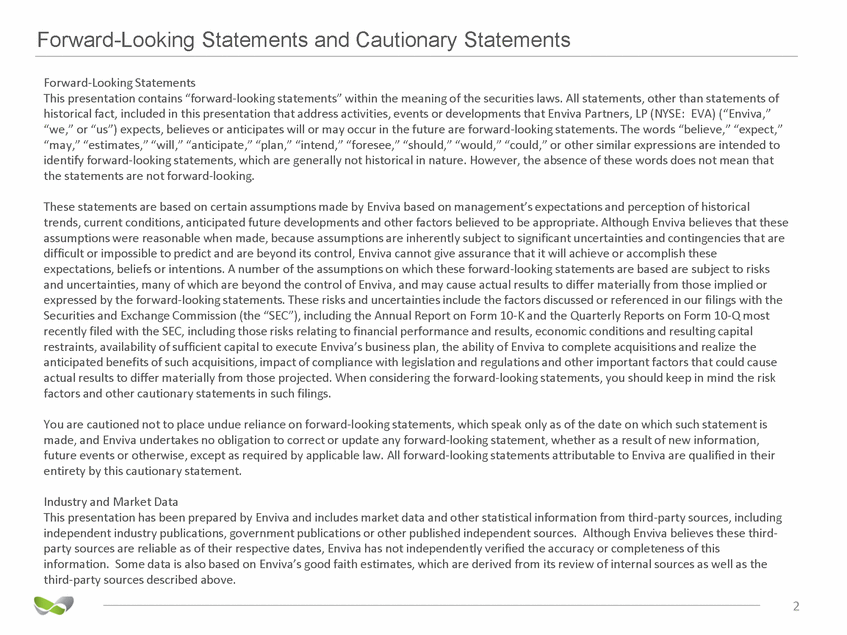
Company Highlights:High-Growth, “Drop-Down” MLP • • • • • Critical supply chain partner for major power generators worldwide More than 40% of renewable energy production in the EU is from solid biomass1 Japan targeting 6.0 to 7.5 gigawatts of biomass-fired generation capacity by 2030 Supportive multinational regulatory frameworks result in forecasted demand growing at 17% CAGR through 20212 Supply not adequate for demand with few providers of scale • • • Fully-contracted, strategically located production plants exporting through multiple deep-water marine terminals Strong fiber baskets deliver low-cost, growing natural resource and stable pricing Embedded low cost to-port logistics and favorable long-term fixed-rate shipping contracts • • Sales strategy is to fully contract our production capacity under long-term agreements Take-or-pay contracts with creditworthy utilities and large-scale power generators with weighted average remaining term of 9.8 years and a contracted revenue backlog of $5.6 billion3 Increasing customer diversification with continued focus on new markets and geographies • • • • Expect aggregate distributions for 2017 of at least $2.36 per unit4 Organic growth inherent in contract profile and via productivity and capacity increases driving margin expansion Consistent track record of drop-down acquisitions from Sponsor; recently agreed to acquire its Port of Wilmington wood pellet export terminal Sponsor actively developing additional plants and terminals to serve growing demand in Europe and Asia • • • • Management team led by industry founders and seasoned public company executives Demonstrated expertise acquiring, building, operating, and contracting / re-contracting platform assets Management rewarded for sustained growth in per-unit distributable cash flow (1) (2) (3) (4) Eurostat – Energy Statistics – quantities (t_nrg_quant); 2014 solid biofuels (excluding charcoal); 2014 renewable energies Hawkins Wright: The Outlook for Wood Pellets – Demand, Supply, Costs and Prices; First Quarter 2017, demand forecast for Industrial pellets As of April 1, 2017 On May 10, 2017, provided guidance of aggregate distributions for 2017 of at least $2.36 per unit 3 Experienced Management Team Substantial Growth Opportunities Long-Term Off-take Contracts Advantaged Assets World’s largest supplier of utility-grade wood pellets to major power generators with almost 3 million metric tons per year (“MTPY”) of contracted production capacity Compelling Industry Fundamentals
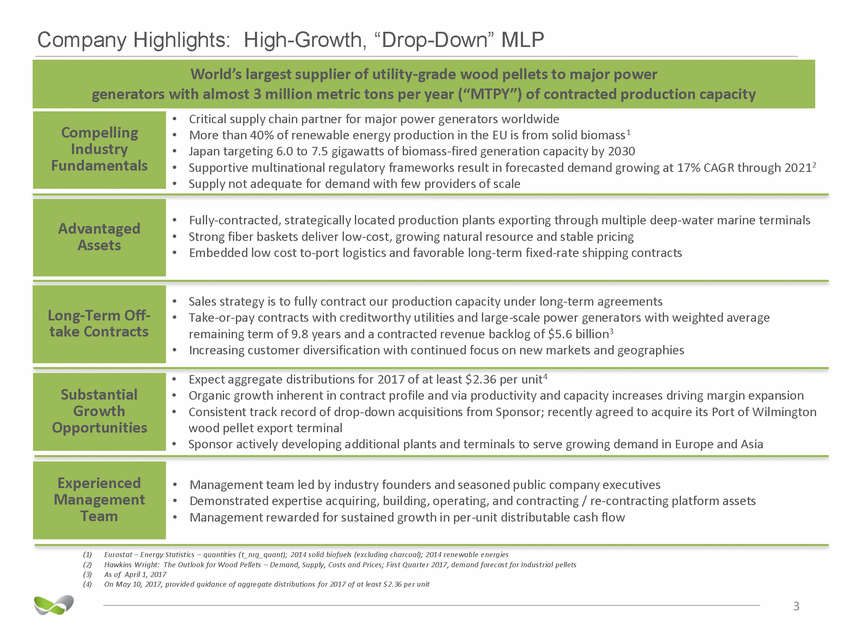
Enviva Solves a Growing, Unmet Challenge for Generators Major industrial economies in the UK and EU are far short of binding, national-level 2020 renewable targets – 2030 targets even more stringent Wood pellets provide low-cost, drop-in solution, driving large demand Market growing rapidly: demand forecasted at 17% CAGR to 2021(2) In addition to renewables targets, Japan is addressing capacity shortage issues following the Fukushima nuclear disaster Enviva is Only Enterprise Supplier of Scale 100% 30 0.1 North America 7.6 75% Asia 50% Europe 25% 0% NL UK BEL FR GER % Short DK % of Target (1) Eurostat News Release – February 10, 2016; Publication: Share of renewables in energy consumption in the EU rose further to 16% in 2014. (2) Hawkins Wright: The Outlook for Wood Pellets – Demand, Supply, Costs and Prices; First Quarter 2017 4 24 8.9 Supply Gap 18 Identified Supply 21.7 20.3 12 6 0 Demand Supply 2021 61% 53% 38% 38% 23% 3% 2021 Industrial Pellet Volumes (in millions MTPY) (2) Progress To Binding 2020 Renewables Targets (1)
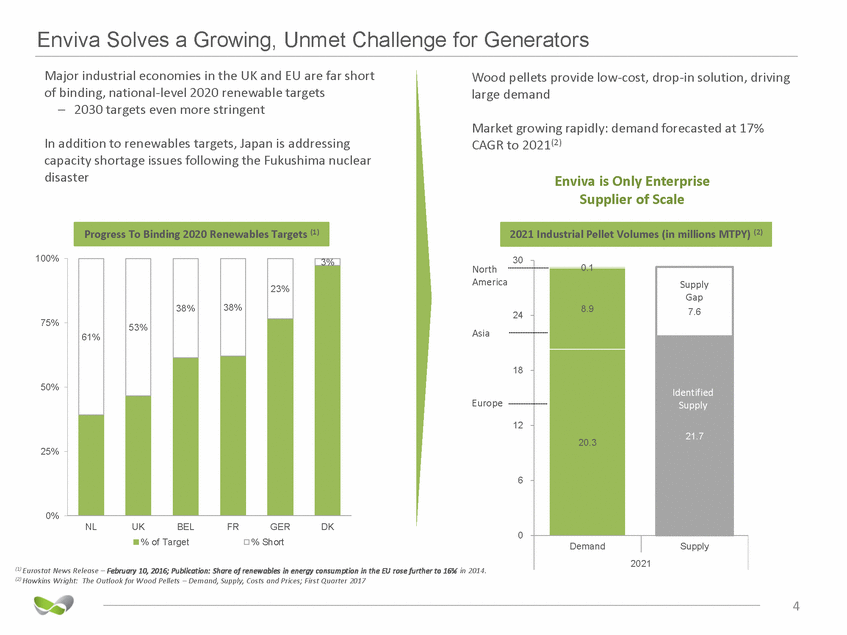
Our Product is the Low-Cost, Drop-In Solution for Coal olar onversion 0 € 50 € 100 € 150 € $0 $50 $100 $150 $200 $250 (1) Enviva; (2) CME Group; (3) Union Pacific (4) Aurora Energy Research – Biomass conversions & the system cost of renewables (November 2016). Total System Cost of Electricity (TSCE) is the per-megawatthour cost of building and operating a generating plant over an assumed financial life including intermittency, security of supply, balancing, grid expansion, and heat adjustment (applic able for CHP only). Data is for Germany and may not be representative of all the markets in which we or our customers operate. CHP is Combined Heat & Power. Expansion costs are related to the electricity grid only. New bu ild CCGT could require gas grid expansions, and the cost is not included here (5) IHS Markit: Levelized Cost of Power Generation in Japan, May 8, 2017. Costs are presented in real terms, as of 2020. In contrast to TSCE, Levelized Cost of Electricity (LCOE) does not include the intermittency costs associated with wind and solar power. LCOE for Dedicated Biomass assumes biomass wood burning power plants with 112 MW of cap acity and 40% efficiency 5 Biomass is the lowest cost solution and essential complement to intermittent sources of renewables Solar Wind Dedicated Biomass CCGT Bioma ss Co-Firing S Onshore Wind B iomass Conversion CCGT Biomass C with C HP Levelized Cost of Electricity in Japan in 2020 (USD per MWh)(5) Total System Cost of Electricity in Germany (€/MWh)(4) Wood Pellet vs. Coal Attributes Wood Pellets (1) NYMEX CAPP Coal (2) Southern PRB Coal (3) Median Heat Content (BTU/lb) 8,000 12,000 8,600 Moisture 4 – 10% < 10% 26 – 30% Ash 0 – 2% < 13.5% 4.6 – 5.7% Sulfur 0 – 0.15% < 1.0% < 1.0%

Familiar Midstream Activities Truck Pipeline Rail Vessel Processing Washing Fractionating BP Valero Wellhead Oil, Gas, NGL, Coal Refineries Generators Drax Dong Engie Processing Drying Densifying Truck Rail Vessel Wood Fiber • • • Enviva performs activities similar to other midstream MLPs No direct exposure to crude oil or natural gas prices or volumes Qualifying income generated by aggregating a natural resource (timber), processing it into fuel at production facilities, transporting pellets to deep-water marine storage terminals, and delivering ratably to utility customers (Private Letter Ruling received in 2011) – No impact from final regulations issued in January 2017 6 RENEWABLE CONVENTIONAL GATHERING GATHERING STORAGE STORAGE DOWNSTREAM MIDSTREAM UPSTREAM
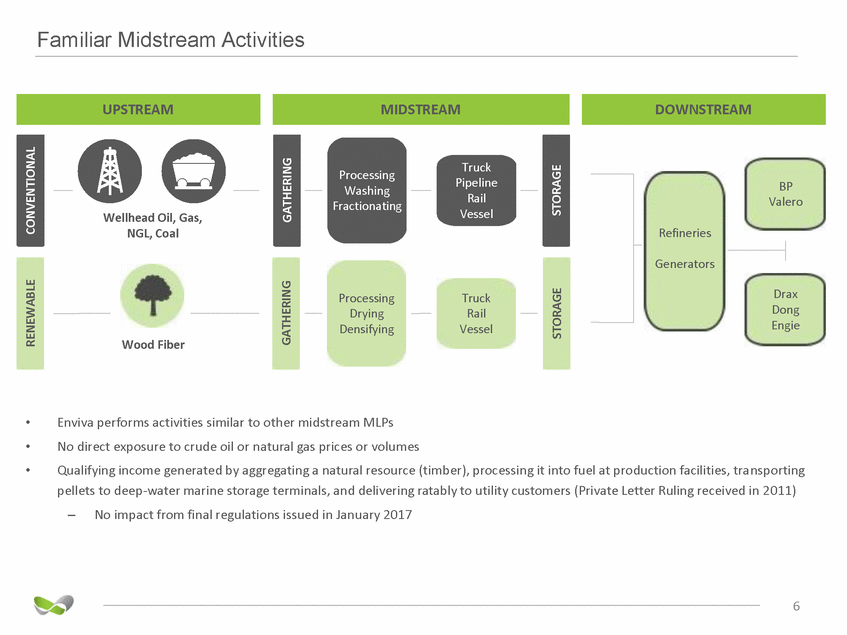
Assets at a Glance Bethesda, MD Southampton, VA – 515K Port of Chesapeake, VA – 90K Northampton, NC – 525K Ahoskie, NC – 375K Sampson, NC – 500K Port of Wilmington, NC – 90K Amory, MS – 120K Cottondale, FL – 720K Port of Panama City, FL – 32K Port of Mobile, AL – 45K+ Location: Mobile, AL, Cooper Marine & Timberlands ChipCo Terminal Storage: Dome storage with 90K MT of capacity Startup: 3rd Party Agreement Startup: 2016, agreed to acquire from our Sponsor 7 Port of Mobile Startup: 3rd Party Agreement Storage: Flex barge storage with 45K+ MT of capacity Port of Chesapeake Location: Chesapeake, VA, wholly-owned by Enviva Startup: November 2011 Port of Panama City Location: Panama City, FL, Port Panama City Storage: Flat warehouse storage with 32K MT of capacity Port of Wilmington Location: Wilmington, NC, Enviva Port of Wilmington Storage: Dome storage with 90K MT of capacity Storage and Terminaling Assets Plant Port Enviva Headquarters Current Production Plants Amory Location: Amory, MS Startup: August 2010 (acquired) Annual Production: 120K MTPY Ahoskie Location: Ahoskie, NC Startup: November 2011 Annual Production: 375K MTPY Southampton Location: Southampton, VA Startup: October 2013 Annual Production: 515K MTPY Northampton Location: Northampton, NC Startup: April 2013 Annual Production: 525K MTPY Sampson Location: Sampson, NC Startup: November 2016 Annual Production: 500K MTPY, expected to increase to 600K MTPY in 2019 Cottondale Location: Cottondale, FL Startup: May 2008 (acquired January 2015) Annual Production: 720K MTPY
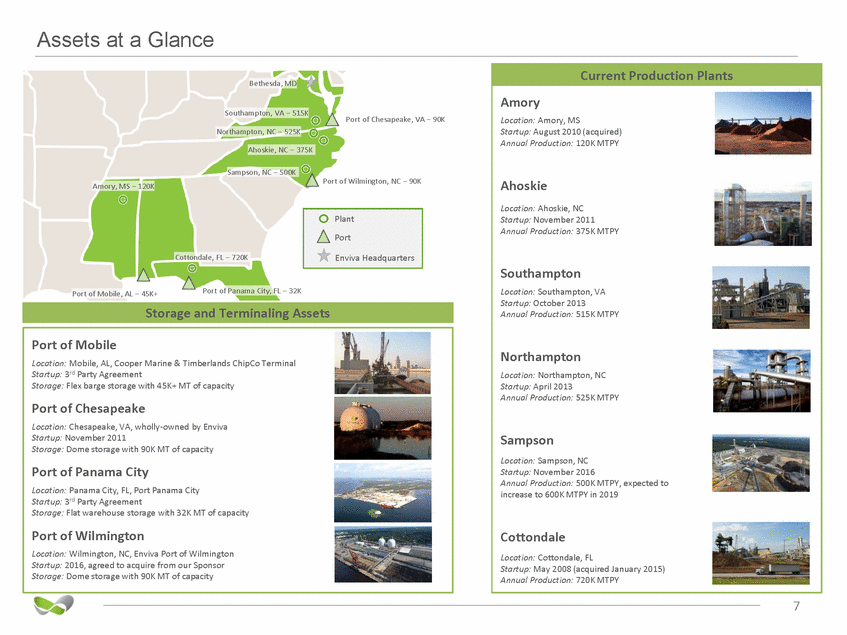
Diversifying Customer Base 8 Regulatory stability, low cost, and dispatchable characteristics of biomass driving customer demand Growing Asian demand driven by new feed-in tariffs, capacity needs, and renewable energy standards Northern European countries where Enviva’s long-term contracted customers are based
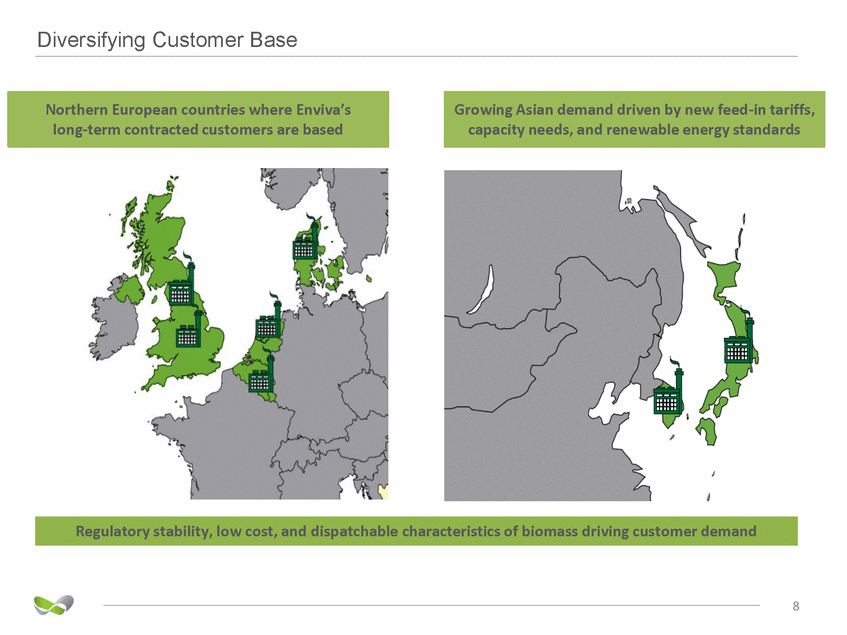
Contracted Production Profile Partnership’s weighted-average remaining term of off-take contracts is 9.8 years and contracted revenue backlog is $5.6 billion1 Contracted volumes in the graph above include only contracts of Enviva Partners, LP or its subsidiaries; does not include the Hancock JV’s contracts. (1)As of April 1, 2017 (2)Does not take into account opportunities the Partnership expects to have to increase production capacity 9 3,500 3,000 2,500 2,000 1,500 1,000 500 0 20172021822019202012021 EVA ProductionLong-term Contracted Volumes Organic increases in production capacity within our portfolio create additional sales opportunities Sales strategy is to fully contract our production capacity under long-term, take-or-pay agreements
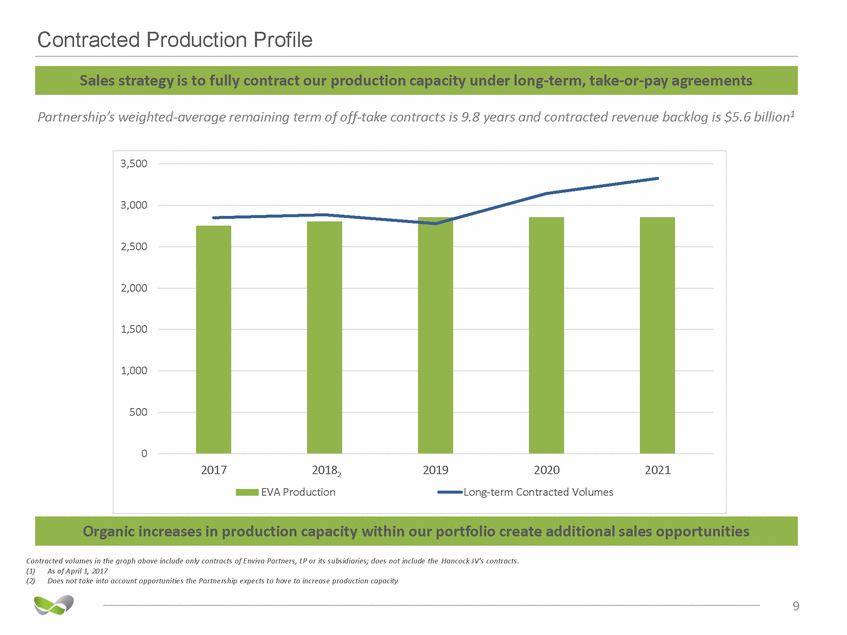
Financial Results $109.7$119.7$116.6 $110.8 $94.4$100.1$100.0 $886.9 $15.3 $19.6 $16.6 $283.9 .12 $3596.878 $19.1 $23.4 $19.7 $215.5 $15.4 $19.5 $15.4 $280.9 $0.412$50.525$0.44 (1) (2) (3) As Reported: our recast results prepared in accordance with GAAP, including Sampson’s results for periods we did not own Sampson and elimination of certain intercompany transactions Excluding recast results from the Sampson Drop-Down prior to the acquisition date on December 14, 2016 Common and subordinated unit See slides 37 and 38 for Adjusted EBITDA, Distributable Cash Flow and Adjusted Gross Margin per Metric Ton reconciliations. See Note 1 of our financial statements, Business and Basis of Presentation, to our 2016 Annual Report on Form 10-K (the “10-K”) and slide 34 for basis of presentation. 10 20152016 2017 In millions, except per metric ton and per unit data Q1Q11 ReRceacsatstR Q2Q2Q3 ecastRecastRecas Q3 tRecast Q4 Q1 Net Revenue1 $1$1140.73.3 $126.5 $122.1 $103.6 $18.5 $43.19 $2.5 Cost of Goods Sold1 $1$0921.7.5 $106.4 Gross Margin1 $1$11.56.8 $20.1 AGM per Metric Ton1 $3$44.01.642$ 41.94$43.11$40 $43.25 Net Income1 $1$.59.5 $2.0 $9.9 $7.9 $$170.6.3 ($8.1) $22.9 $14.6 Adjusted EBITDA2 $1$61.89.5 $22.2 Distributable Cash Flow2 $1$31.49.8 $12.6 $0.555 Distribution per Unit3 $-0.51 $0.563 $0.535 Distribution increased every quarter since initial public offering
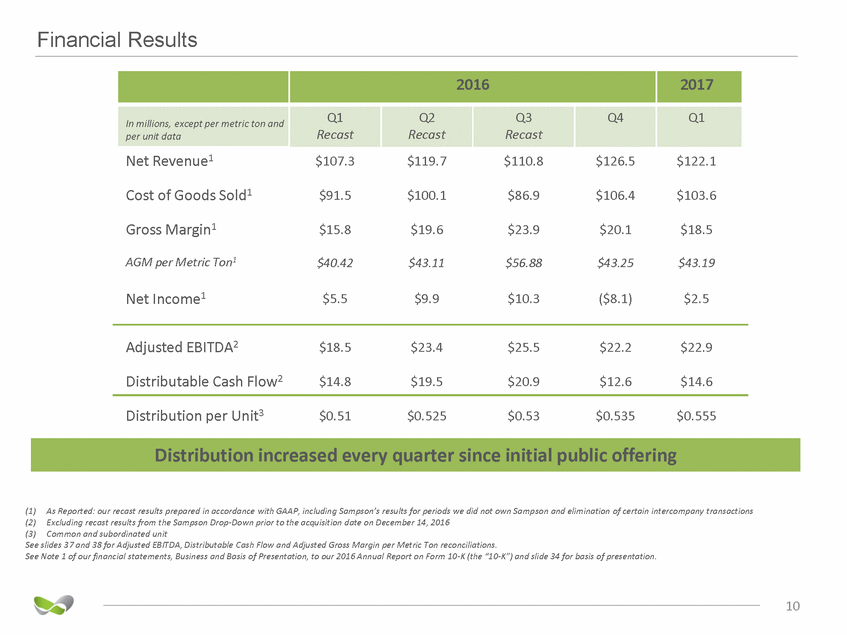
Outlook & Guidance (1) (2) (3) Net of amortization of debt issuance costs and original issue discounts Prior to any distributions paid to our general partner Common and subordinated unit Guidance was provided on May 10, 2017 See slide 39 for Adjusted EBITDA and Distributable Cash Flow reconciliations 11 2017 guidance above includes the impact of the Port of Wilmington drop-down, but does not include the impact of any other potential acquisitions or drop-downs In millions, except per unit figures 2017 Net Income $29.0 - $33.0 Adjusted EBITDA $111.0 - $115.0 Maintenance Capex $5.1 Interest Expense1 $29.7 Distributable Cash Flow2 $76.2 - $80.2 Distribution per Unit3 of at least $2.36
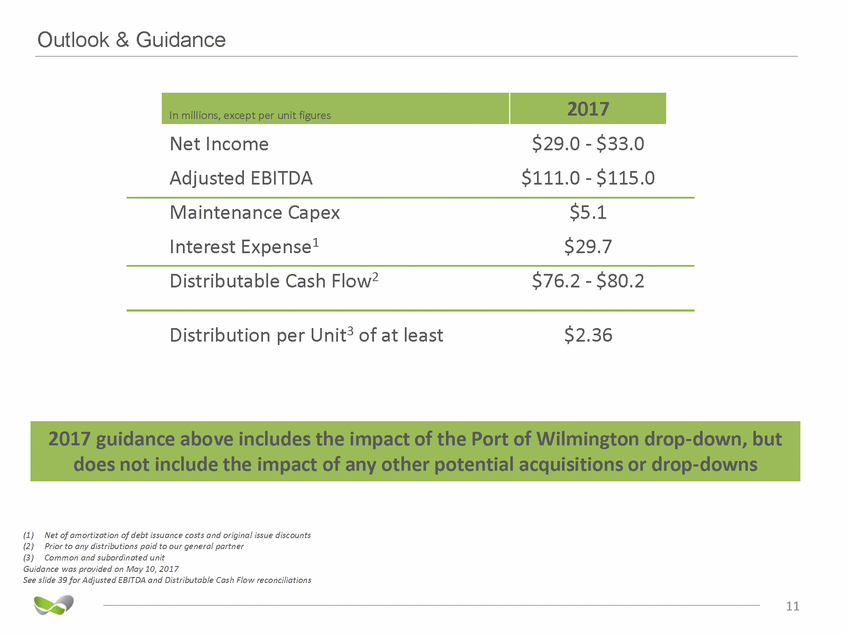
Visible Growth Visible Adjusted EBITDA Growth $20+ $6 - $8 $5 - $8 $110 – $114 2017 Guidance1 excluding Port of Wilmington Port of Wilmington Drop-Down2 Port of Wilmington Throughput from Hamlet3,4 Hamlet plant Drop-Down5, 6 + 1% to 2% annual productivity increases materially improve AGM Based on guidance provided on and as of November 3, 2016, and affirmed on February 23, 2017. For a reconciliation of estimated adjusted EBITDA to estimated net income, please see slide 39 For a reconciliation of estimated adjusted EBITDA to estimated net (loss) income, please see slide 40 The Port of Wilmington is expected to generate run-rate incremental adjusted EBITDA of approximately $8.0 million initially, increasing to $16.0 million per year once the Hamlet plant reaches its expected full production rate of 600,000 MTPY. Additional details are available as part of our Earnings Release as of May 10, 2017 For an explanation of why we are unable to reconcile the estimated adjusted EBITDA of $16.0 million per year for Port of Wilm ington once the Hamlet plant reaches its expected full production rate to the most directly comparable GAAP financial measures, please see slide 41 Although we expect to have the opportunity to acquire assets or completed development projects, including the Hamlet plant, f rom our sponsor or the Hancock JV in the future, we cannot assure you that our sponsor or the Hancock JV will be successful in completing their development projects or that we will successfully n egotiate an agreement with our sponsor or the Hancock JV to acquire such assets or projects The estimated incremental adjusted EBITDA from the Hamlet plant Drop-Down is based on similar plants in our portfolio. For an explanation of why we are unable to reconcile this measure to the most directly comparable GAAP financial measures, please see slide 41 (1) (2) (3) (4) (5) (6) 12
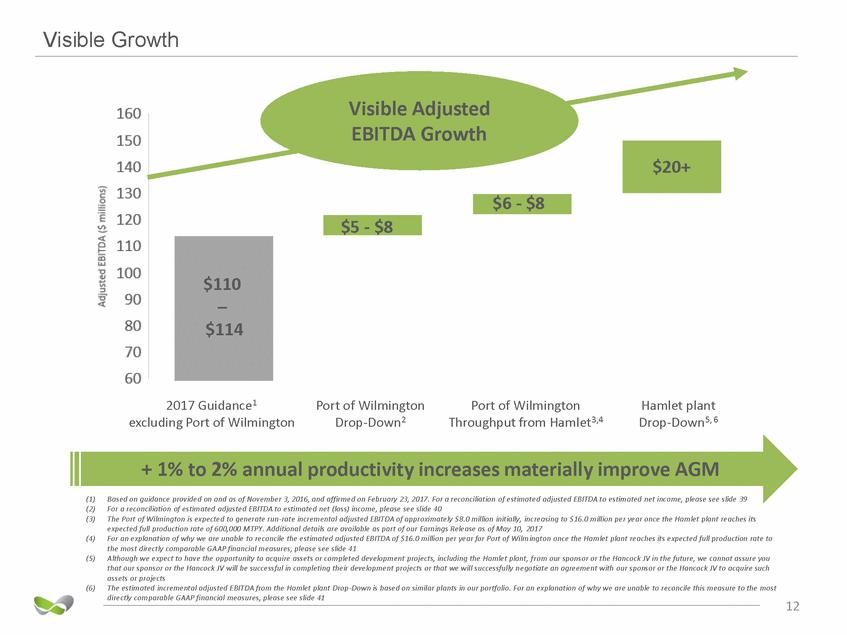
Drop-Down Inventory • “Build and Copy” replica of Enviva Port of Chesapeake • Fully operational with ~1.0 million MTPY throughput contracted with Sampson and 3rd party volumes – – Contracted to receive, store and load Hamlet plant throughput Total capacity of approximately 3 million MTPY • Agreed to acquire the terminal on or about October 2, 2017 with initial payment of $56 million – Second payment of $74 million upon deliveries from the Hamlet plant, expected in late 2018 • Approximately $8 million1 incremental estimated run-rate adjusted EBITDA, increasing to approximately $16 million2 annually assuming Hamlet plant is fully operational Enviva Port of Wilmington (NC) terminal • Currently commencing construction of the permitted plant site in Hamlet, North Carolina – – “Build and Copy” replica of our Sampson plant Fully ramped production capacity of 600,000 MTPY Enviva Sampson Plant Enviva Hamlet Plant • Located in a robust fiber basket, with an expected excess of wood fiber growth over uses of nearly 6 million tons annually3 after accounting for the plant’s demand 3rd Party Plant Enviva Port of Wilmington, NC • Production expected to support our Sponsor’s off-take contract to supply the Macquarie MGT Teesside project in the UK (1) (2) (3) For a reconciliation of estimated adjusted EBITDA to estimated net (loss) income, please see slide 40 For an explanation of why we are unable to reconcile this measure to the most directly comparable GAAP financial measures, pl ease see slide 41 Biomass Resource Study for Wood Pellet Plants in Hamlet, NC and Sampson County, NC; prepared by Forest2Market, Inc. 13 Enviva Pellets Hamlet (NC) Enviva Port of Wilmington (NC)
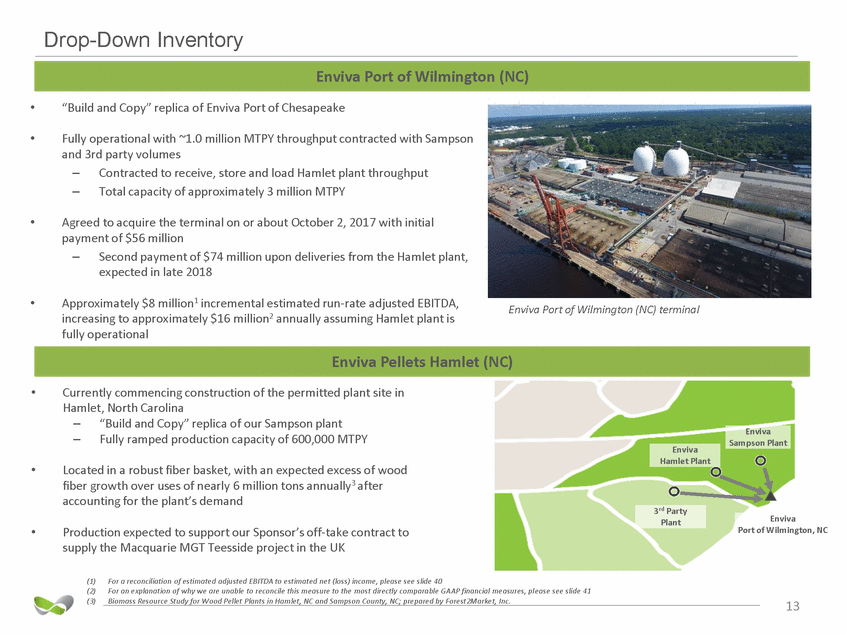
Adjacent Markets Experiencing Rapid Demand Growth large, rapidly growing market Industrial Pellet Forecasted Demand(1) Heating Pellet Forecasted Demand(1) 35,000 30,000 30,000 25,000 25,000 20,000 20,000 15,000 15,000 10,000 10,000 5,000 5,000 - 0 20162017 2018 2019 2020 2021 2016 2017 2018 20192020 2021 Europe Asia North America Europe Asia North America Other (1)Hawkins Wright: The Outlook for Wood Pellets – Demand, Supply, Costs and Prices; First Quarter 2017. North America industrial pellet demand forecasted to be 100k tons in each of 2016-2021 14 Metric Tons (000's) Metric Tons (000's) Wood pellets are largely fungible across industrial and heating markets … but increasingly shipping to another Enviva primarily serves industrial market…
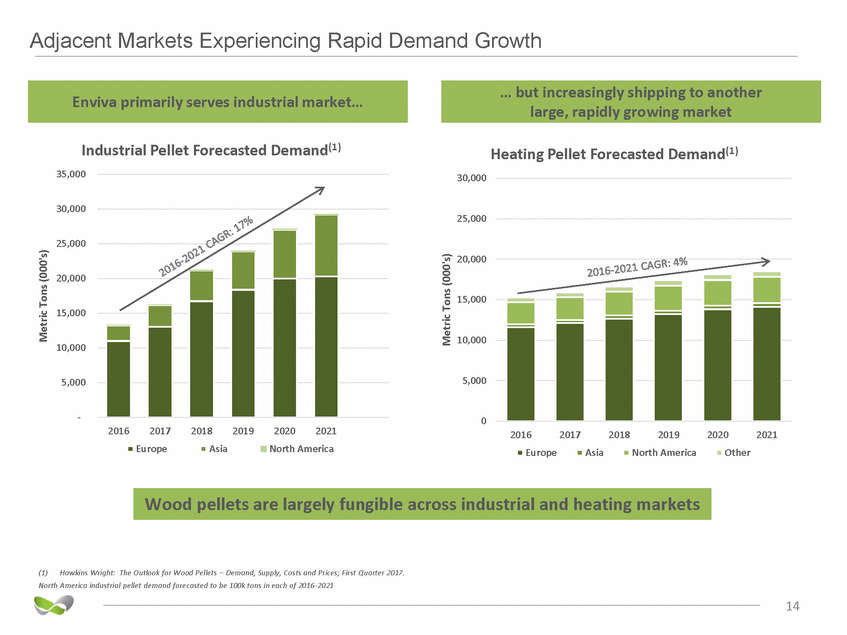
Additional Sponsor Development and Market Expansion Opportunities European Thermal Opportunity (1) Assets Under Control are shown at estimated capacities and approximate locations. Sites Under Assessment assets are shown at approximate locations. 15 Market Leadership Enables Sponsor’s Development Pipeline (1) Hamlet, NC Laurens, SC Port of Wilmington, NC Childersburg, AL Abbeville, AL Lucedale, MS Port of Jacksonville, FL Port of Pascagoula, MS In OperationUnder Construction Under ControlUnder Assessment 2 - 3 million tons of additional export capacity to serve growing European and Asian markets
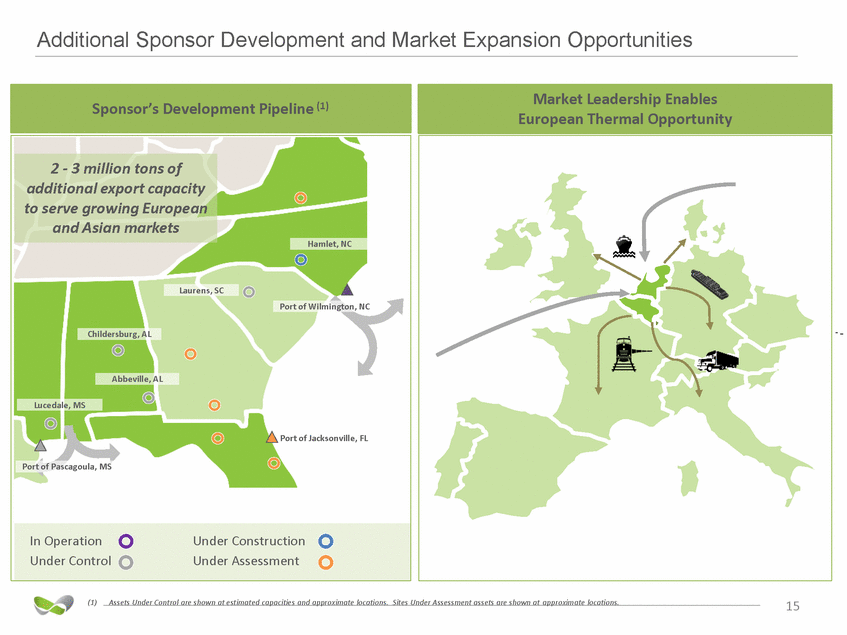
Breaking the Fiber Logistics Barrier Unlocks North American Basis Differential Wood Chip Price (US$/Dry Ton) Sweden $130 Latvia1 $130 $131 Germany Japan $120 Southern US $63 Australia2 $138 Source: RISI World Timber Price Quarterly – July 2016 for first Quarter 2016 1. 2. Latvia price is CIF Sweden Australia price is as of second quarter of 2015 16 Pelletizing Fiber Breaks Logistics Barrier and Enables Worldwide Delivery Annual Global Trade in Wood Products is Valued at over $250 billion
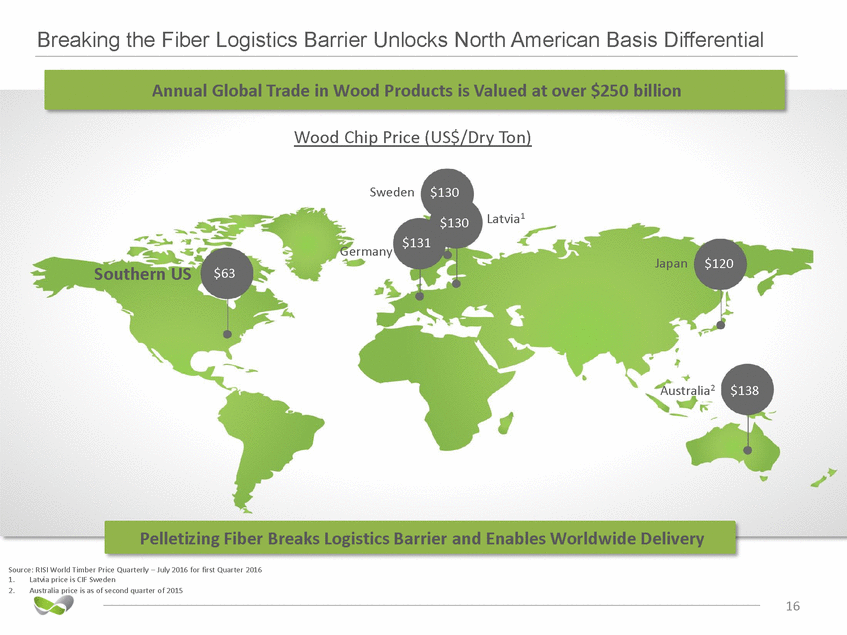
Market Growing Due to Application Diversity • Long-term contracted demand for wood pellet displacement of coal has enabled substantial infrastructure investment in processing and logistics assets Resulting global distribution capability for low cost fiber creates emerging demand from other applications for wood pellets • Consumer Preference & Commodity Price Driven Chemicals Polymers Cellulosic (C5 / C6 sugars) Lignin bi-products Price per ton Industrial Steam District Heating Loops Retail Heating Combined Heat & Power Coal Displacement Policy-driven (1)Graph illustrative only 17 Market Application and Potential Size(1)
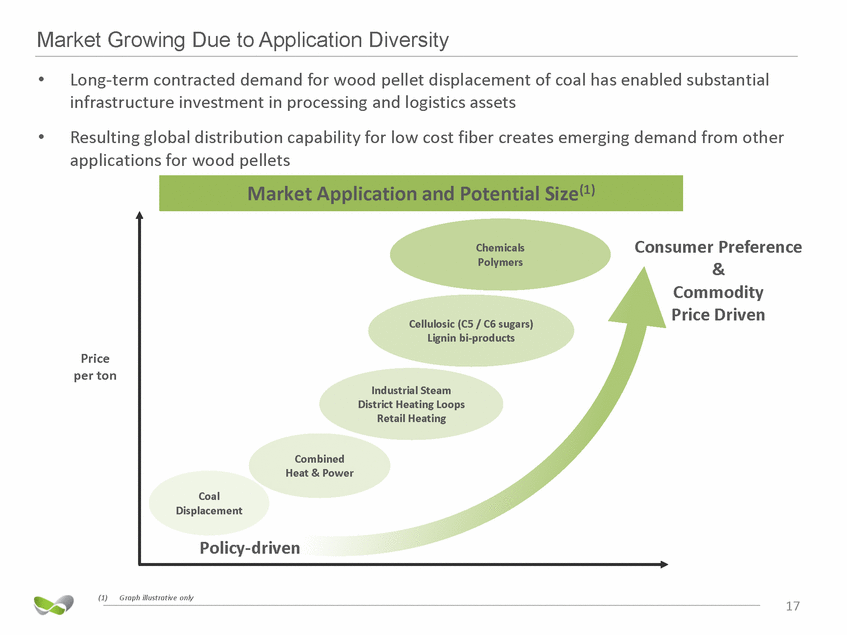
Enviva: A Compelling Story Compelling Industry Fundamentals Experienced Management Team Advantaged Assets Substantial Growth Opportunities Long-Term Off-take Contracts 18
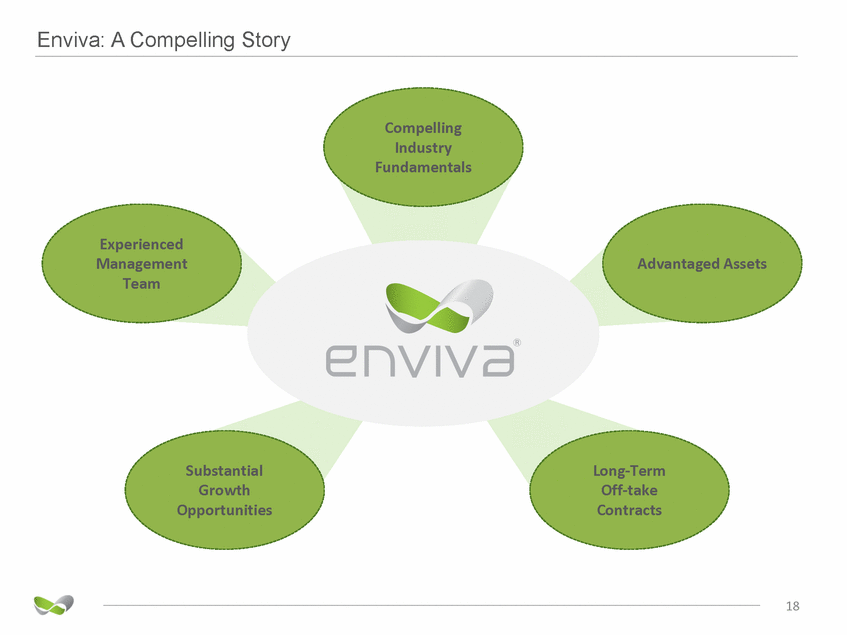
Enviva’s Port of Chesapeake Marine terminal Additional Materials
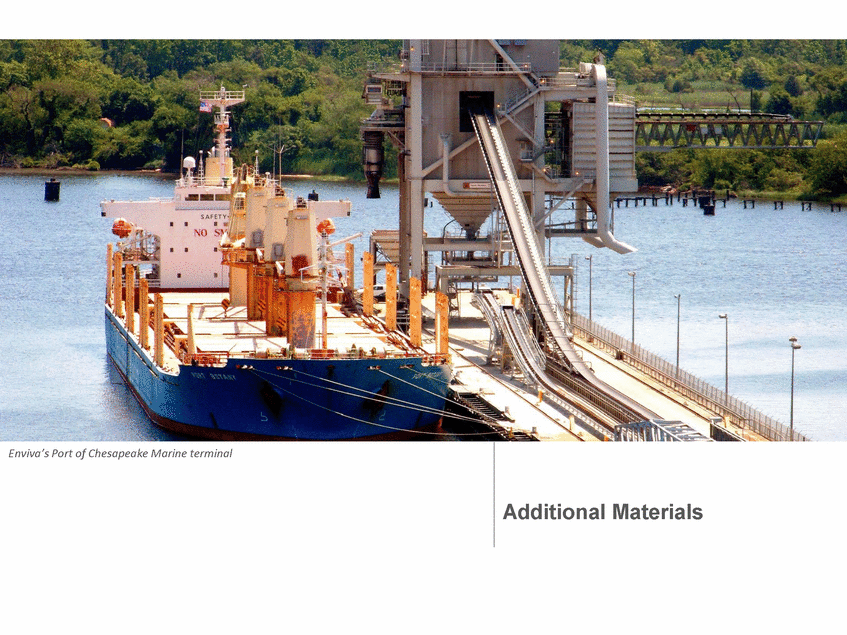
Limited Competition • Pellet industry historically characterized by fragmented worldwide supply base Utility trade almost exclusively one-to-one agreements between standalone plants (Thousands of MTPY) Enviva (U.S.)* Graanul Invest (Baltic States) Pinnacle Pellet (Canada) Drax Biomass (U.S.) Georgia Biomass (U.S.) FRAM Renewable Fuels (U.S.) Highland Pellets (U.S.) Pacific Bioenergy (Canada) German Pellets (U.S.) Navigator (U.S.) Tanac (Brazil) Westervelt (U.S.) Rentech (Canada) • • Enviva distinguishes itself with an industrial, enterprise-scale approach – Carefully assembled team of foresters, manufacturing experts, logisticians, and engineers Multi-plant profile allows for optimization Years of operational knowledge, employs a “build and copy” approach Conservative balance sheet Multi-billion dollar financial investors experienced in energy and wood products sector – – 0 600 1,2001,8002,4003,0003,6004,200 United States* – – Baltic States Canada Europe Russia and Eastern Europe Rest of the World 0 2,000 4,000 6,000 8,000 10,000 Current capacity Under construction or financed for completion by 2018 Source: Hawkins Wright: The Outlook for Wood Pellets – Demand, Supply, Costs and Prices; First Quarter 2017 * Includes the Hamlet plant currently being developed by our Sponsor’s joint venture. ¹ Hawkins Wright supply and demand data. Assumption of $220/ton of installed capacity 20 Industry growth supports $1.7 billion additional investment opportunity for experienced and well-capitalized operator(1) Worldwide Industrial Pellet Producers and Regional Production
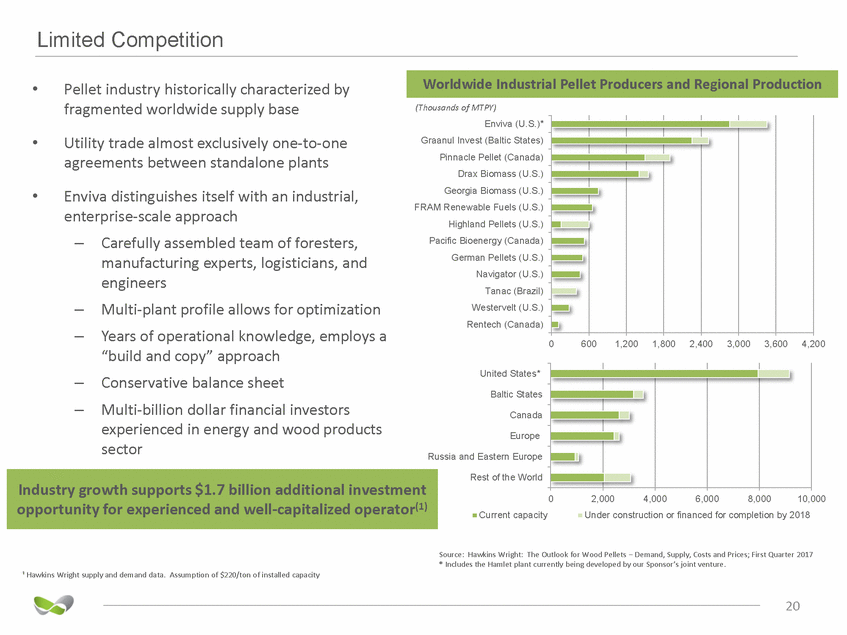
Advantaged Assets Port of Chesapeake, VA Southampton, VA Northampton, NC Ahoskie, NC Hardwood Roundwood Pine Roundwood Open / Farmland 1MM tons annual facility demand 475MM+ tons inventory 8MM+ tons net annual fiber excess (1) 65,000+ private landowners 1.4MM MT+ consolidated annual throughput ~75mi average distance to port Dedicated, Low-Cost, Haul to Wholly-Owned Terminal $50 $40 $15 $12 $30 $20 $10 $9 Enviva’s 1.4MM Tons $6 $3 $-$0 250 500 750 1,0001,2501,5001,7502,000 MTPY of Pellet Throughput 2,250 '00 '01 '02 '03 '04 '05 '06 '07 '08 '09 '10 '11 '12 '13 '14 '15 '16 (1) FIA Data (2) Timber Mart-South-North Carolina 1991 – 2016 (3) Source: Enviva 21 $ / MT Port Costs Stable Delivered Cost of Fiber (2) North Carolina Pine Pulpwood 1991 - 2016 CAGR = 1.9% (2) North Carolina Hardwood Pulpwood 1991 - 2016 CAGR = 2.2% (2) Cost Advantage of Vertically Integrated Terminal (3) Operating Leverage of Northampton 7 mi. Robust Resource Availability Integrated Low-Cost Logistics
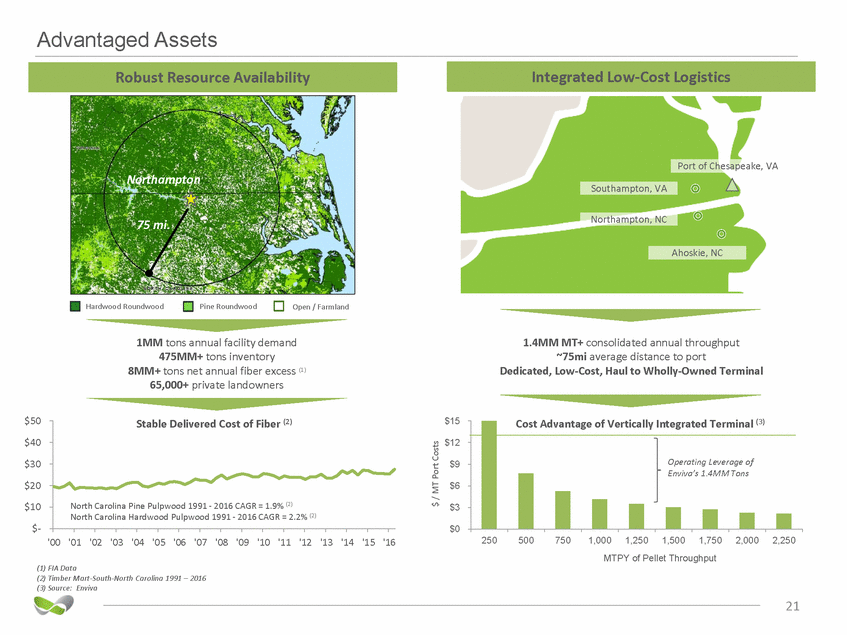
Lower Lifecycle Greenhouse Gases United Nations report: “greenhouse gas emissions from coal are 4 times greater than forest wood bioenergy on a lifecycle basis” European Union report: “the vast majority of the biomass used today in the EU for heat and power are considered to provide significant greenhouse gas savings compared to fossil fuels” Source: IPCC, 2014: Climate Change 2014: Mitigation of Climate Change. Contribution of Working Group III to the Fifth Assessment Report of the Intergovernmental Panel on Climate Change Source: State of play on the sustainability of solid and gaseous biomass used for electricity, heating and cooling in the EU. European Commission. July 2014. Carbon Savings: “The GHG intensity of pellet based electricity is 74% to 85% lower than that of coal-based electricity” Authors include Chair of EPA’s Scientific Advisory Board Panel for Biogenic Carbon Source: Khanna et al. Carbon savings with transatlantic trade in pellets: accounting for market-driven effects. 2015. Oak Ridge National Laboratory scientists: 100 U.S. Forest Scientists: “The carbon benefits of sustainable forest biomass energy are well established” “a robust body of research confirms that forests that are sustainably managed for wood products and energy are associated with long-term reductions in atmospheric carbon dioxide” Source: Dale et al. Ecological objectives can be achieved with wood-derived bioenergy. The Ecological Society of America. 2015. Source: Letter to Gina McCarthy, Administrator, EPA, from professors affiliated with the National Association of University Forest Resource Programs. November 14, 2014. 22
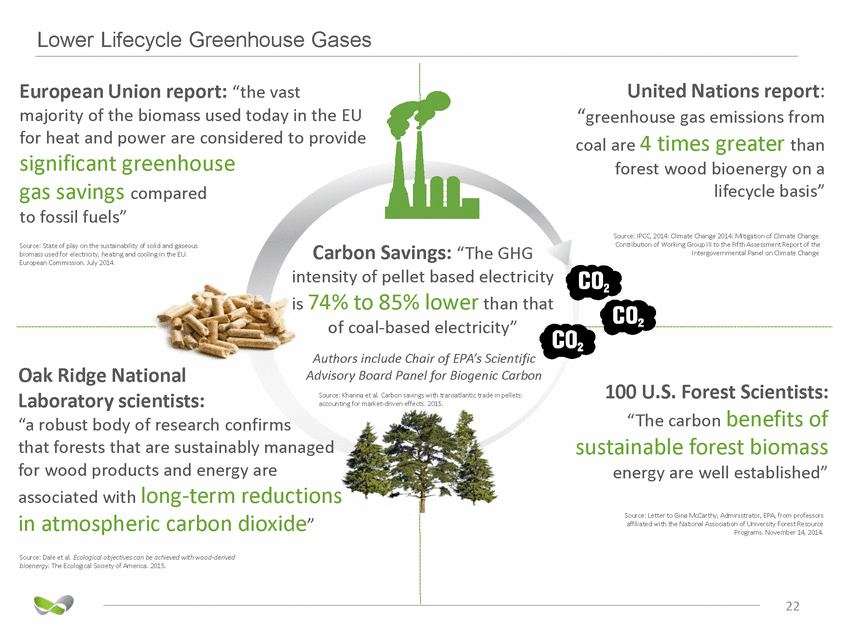
Our Activities Sustain Thriving, Healthy Forests Our wood came from these sources:2 37% Mixed Pine & Hardwood Forests3 <1% Landscaping & Arboricultural Activities 4% Upland Hardwood 30% Southern Yellow Pine Forests3 Forests 3 3% Bottomland Hardwood Forests3 26% Mill & Industry Residues4 1.USDA - http://blogs.usda.gov/2015/06/08/study-finds-increasing-wood-pellet-demand-boosts-forest-growth-reduces-greenhouse-gas-emissions-creates-jobs/. 2015 2.The information in this panel is based on wood supplied to current Enviva facilities during the second half of 2016. Enviva initiated the sale of the Wiggins plant in early 2017. Therefore, the facility’s wood sourcing data are not included in this summary, which would not have a significant effect on these summary statistics. 3. This wood consists of undersized or “understory” wood that was removed as part of a larger harvest; tops and limbs; brush and “thinnings” that were removed to make additional room for planted pines to grow. 4. We can identify the individual production facilities that provided these materials. 23 Certifications and Ongoing Audits by Independent Agencies: “An industry that can reduce greenhouse gas emissions, increase forest growth, and create jobs sounds too good to be true. But that is the reality of the emerging wood pellet market in the Southern U.S.”1 -USDA Chief Economist Robert Johansson Our Track & Trace Program, a first-of-its-kind system, is an important element of our responsible wood supply program and provides unprecedented transparency into our procurement activities
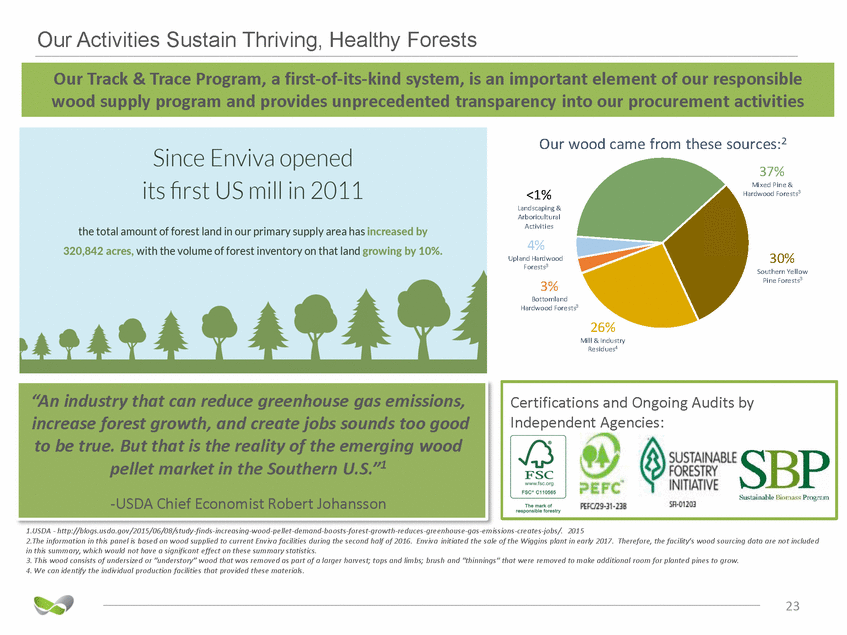
Supply Gap Created by Multiple Hurdles to Entry LIMITED SUPPLY CHAIN INFRASTRUCTURE Fragmented Natural Resource Base •Off-take contract pricing escalators Deep Process Capabilities Required Wood Aggregation Truck / Rail Loading Size Reduction Wood Receiving & Storage Debarking & Chipping Port Storage Shipping Drying Pelleting Commitment to Excellence in Safety, Sustainability & Reliability 24 •Long-term, fixed-price shipping contracts with reputable logistics providers enable long-term margin stability and mitigate exposure to uncontrollable changes to cost position •Plants strategically located in one of the most attractive wood fiber regions in the world •Proximity to terminals results in low “to-port” transportation costs •Cost-effective transportation due to ownership and/or control of ports
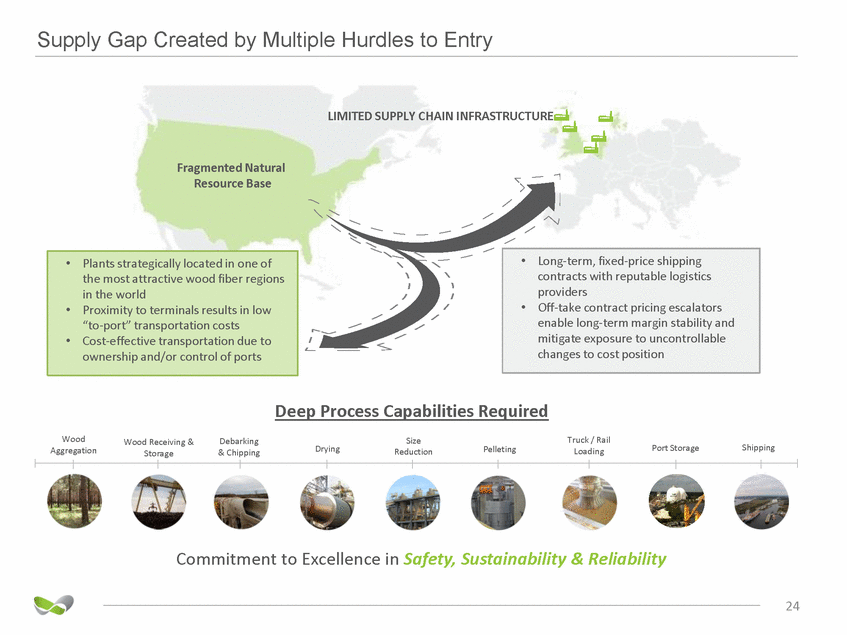
Business Model Mitigates Risk Off-take Contracts Long-term, take-or-pay, price determinant with make-whole and market-based damages Predominantly U.S. Dollar denominated Cost pass-throughs and escalators protect against inflation, cost of fiber, and fuel costs Provisions to protect against changes in laws, import duties and taxes • • • • Markets / Financial Conservative balance sheet No direct exposure to crude oil or natural gas prices Customary insurance program geared for operations and scale of business Currency hedges in place to mitigate relatively small amount of foreign currency risk Hedged interest rate risk Operations & Fiber Geographically dispersed fleet of production plants located in strong fiber baskets Strategically located ports providing optimal to-port logistics “Build and copy” approach facilitates common processes and operational knowledge • • • • Durable cash flows • • • • Shipping Long-term, fixed-rate shipping contracts matching off-take tenor and volume Multiple shipping partners Cost of bunker fuel passed through to customer • • • Note: Off-take contract terms are examples of various provisions within our portfolio of contracts; no single contract in our portfolio contains every provision listed above 25
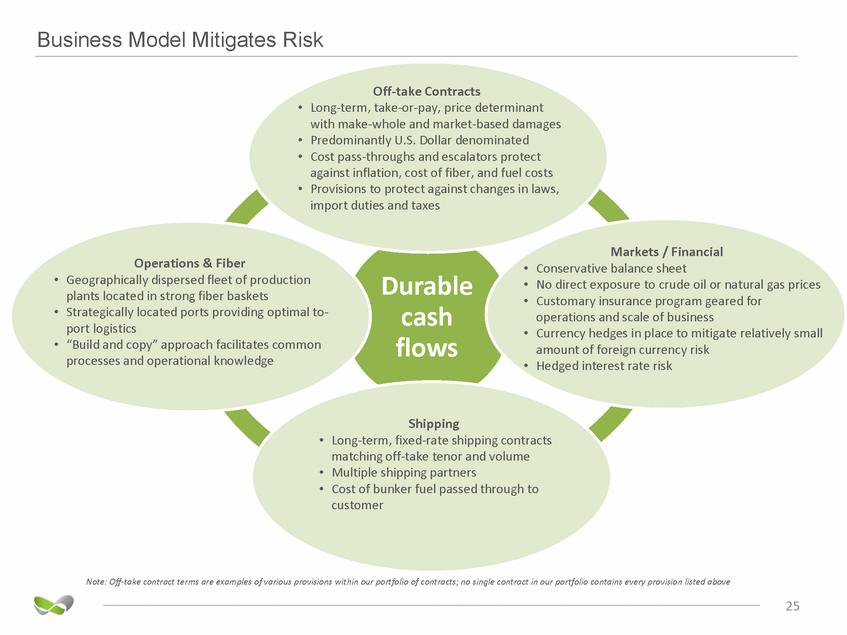
Contract and Market Update - Europe • In the UK, support for the reduction of carbon emissions and renewable energy continues after the Brexit vote. In July 2016, the UK announced its 5th carbon budget with emission reduction requirements for 2030, after previously announcing plans to shut down all coal-fired power plants by 2025. In October, parliament agreed to extend the government’s powers to award new contract for difference (CfD)2 incentives for new low-carbon energy projects out to 2026 from the original end date of 2020 • The Macquarie MGT Teesside project in the UK achieved financial close. Our sponsor is the sole supplier of the approximately 1 million MTPY of imported biomass required by the plant, and the Partnership has contracted with our sponsor to supply 470,000 MTPY of these volumes, commencing in 2019 and continuing through 2034 • Drax received EU state-aid approval of the CfD for its third 660 megawatt (“MW”) biomass unit, anticipated to require more than 2 million MTPY. Drax has stated that it could convert the remaining three coal-burning units to biomass in the next two to three years under the right conditions. • DONG Energy, the largest power producer in Denmark, announced that it will completely eliminate the use of coal in its generation of power and heat by 2023, and will replace the fuel with biomass. DONG Energy already has two facilities burning wood pelle ts, which are expected to consume approximately 1.8 million MTPY of wood pellets at full capacity. • In the Netherlands, biomass projects were awarded the majority of the 5.0 billion euros in funding available through the second and final round of applications for the 2016 renewable incentive program, including 2.1 billion euros awarded to coal plants planning to co-fire biomass. Both rounds in 2016 were heavily oversubscribed, and RWE, Engie, and Uniper received awards. The Minister of Economic Affairs has announced that the program budget will be increased from 9.0 billion euros in 2016 to 12.0 b illion euros in 2017. ¹ Hawkins Wright: The Outlook for Wood Pellets – Demand, Supply, Costs and Prices; First Quarter 2017 ² CfD – Contract for Difference is a legally binding contract with the UK government that supports biomass conversions in the UK 26 European industrial wood pellet demand expected to grow to 20 million tons by 2021, a 13% annual growth rate1
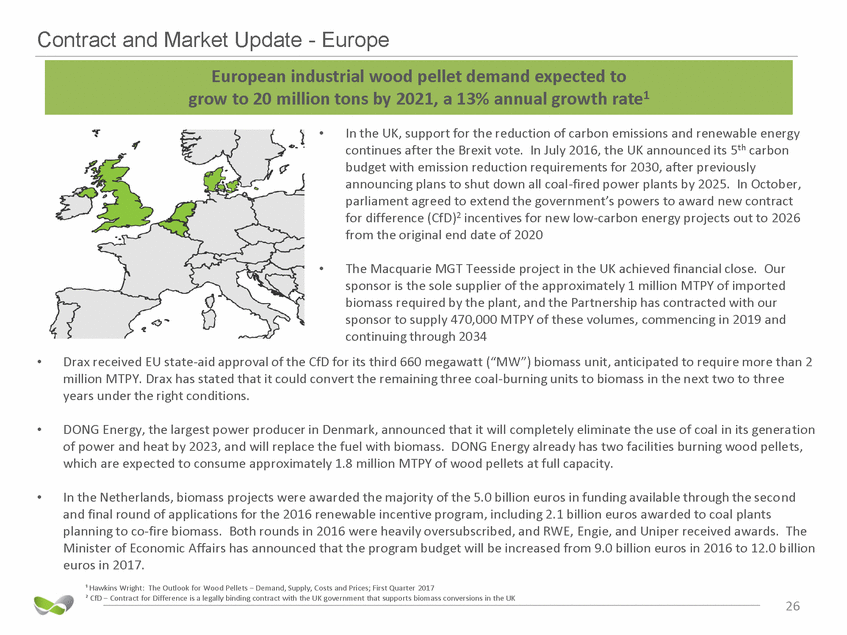
Contract and Market Update – Asia and Rest of World • In Japan, nearly 3.2 gigawatts (“GWs”) of biomass-fired capacity have been approved through the feed-in tariff (FiT) program, of which approximately 500 MWs are commissioned. The Japanese government has set a target of 6.0 to 7.5 GWs of biomass-fired capacity by 20302, which represents demand for 15 to 20 million MTPY of biomass • Several recently announced biomass-fueled projects in South Korea are expected to be operational by 2020, increasing the expected South Korean demand for wood pellets up to 6 million MTPY. As this demand is well in excess of expected domestic supply, a significant amount of wood pellets are expected to be imported under long-term contracts, representing a shift from the short-term tender mechanism currently used to purchase biomass in South Korea • China’s National Energy Administration announced that the country will spend at least $360.0 billion on renewable energy through 2030. In addition, published reports indicate that China is expected to increase biomass-fired generation capacity from 10.3 GWs in 2015 to 15 GWs by 2020 • The Partnership signed an agreement to supply a minimum of 160,000 metric tons over three years to Albioma’s 36.5 megawatt, biomass-fueled combined heat and power facility in Martinique, subject to the facility achieving full operation • Albioma’s model is replicable in island nations around the world, highlighting the economic benefits of coupling locally sourced biomass with imported wood pellets to displace higher-cost fossil fuels with a compelling environmental solution ¹ Hawkins Wright: The Outlook for Wood Pellets – Demand, Supply, Costs and Prices; First Quarter 2017 2 Bloomberg New Energy Finance: Japan Biomass Market Update; June 30, 2016 27 Asian industrial wood pellet demand expected to grow to nearly 9 million tons by 2021, a 32% annual growth rate1
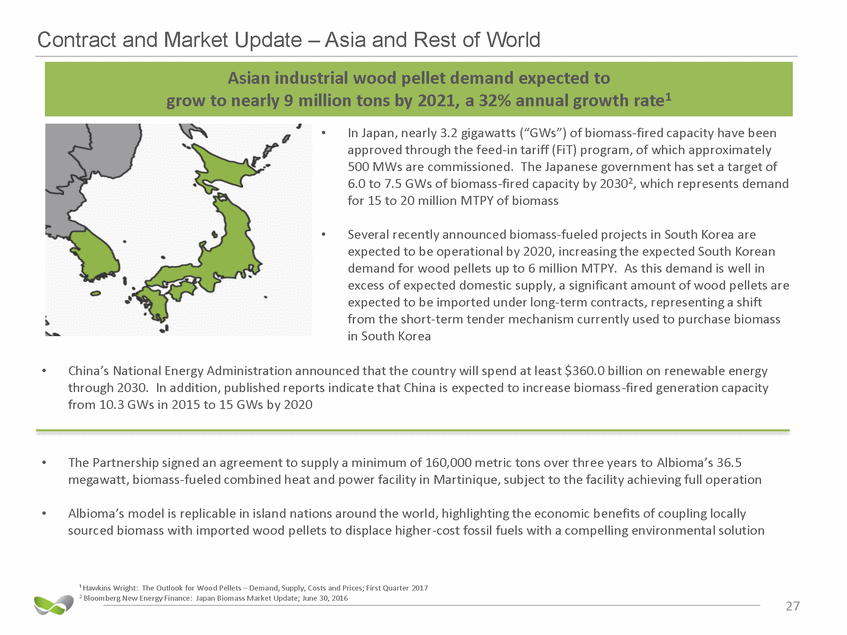
Contracts and Productivity Drive Organic Growth • Fully contracted operating facilities create platform for organic growth – Off-take contract price escalation delivers topline growth – Focus on operational excellence – safety, reliability, sustainability, and continuous improvement delivers cost reductions – “Build and copy” fleet of large scale assets create further operating leverage via common processes, equipment, and spares; shared services across facilities – Standardized processes make debottlenecking/capacity increases easy to replicate Resulting 1% to 2% annual productivity increases materially improve AGM per metric ton • 3,000 $60 2,500 $50 2,000 $40 1,500 $30 1,000 $20 500 $10 - $0 2014 2015 2016 2014 2015 2016 (1) See slide 37 for AGM per Metric Ton reconciliations. 28 Adjusted Gross Margin (AGM) per Metric Ton1 Production (Metric Tons)
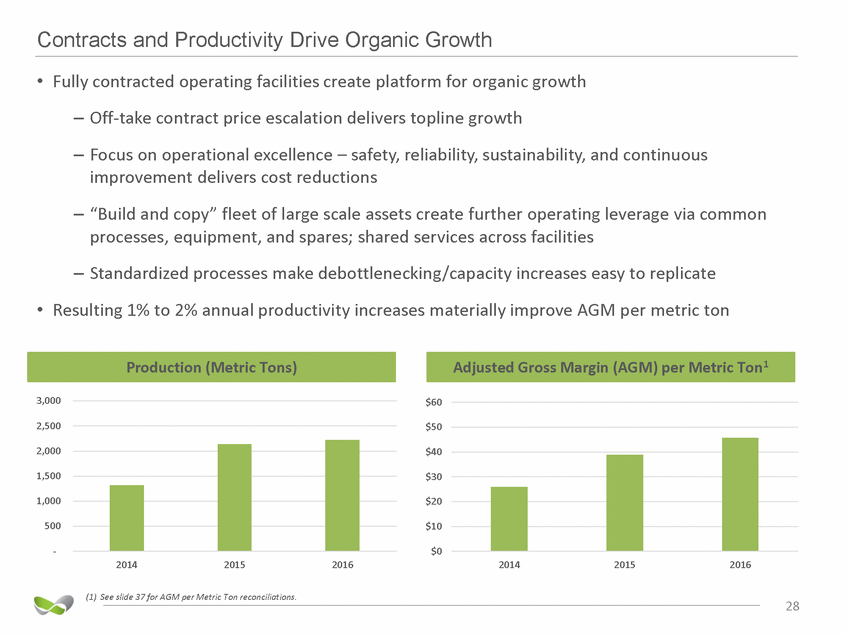
Growth Supported by Committed Investors Invested • Principal owner of our Sponsor Enviva Holdings, LP “Our Sponsor” Enviva Partners, LP NYSE: EVA for long-term Sponsor Assets Development Finance, Construction, and Commissioning 29 Operations Attractive cost of capital with access to capital markets funding ROFO on JV and Joint Venture •Separate entity that finances, develops, constructs, and commissions projects from Sponsor pipeline •Currently owns the operational deep-water marine terminal in Wilmington, NC and is developing and evaluating other wood pellet production plants •Enviva Holdings, LP can compel the JV to sell assets to EVA if certain investment returns are achieved •Capital can be recycled for future growth Strong Development Engine & Customer Contract Pipeline • John Hancock is the US unit of ManuLife Financial and one of the world’s largest timberland investment managers • $10.5 billion and 5.8 million acres of timberlands under management $550 Million • $34 billion energy/power private investment firm to Date
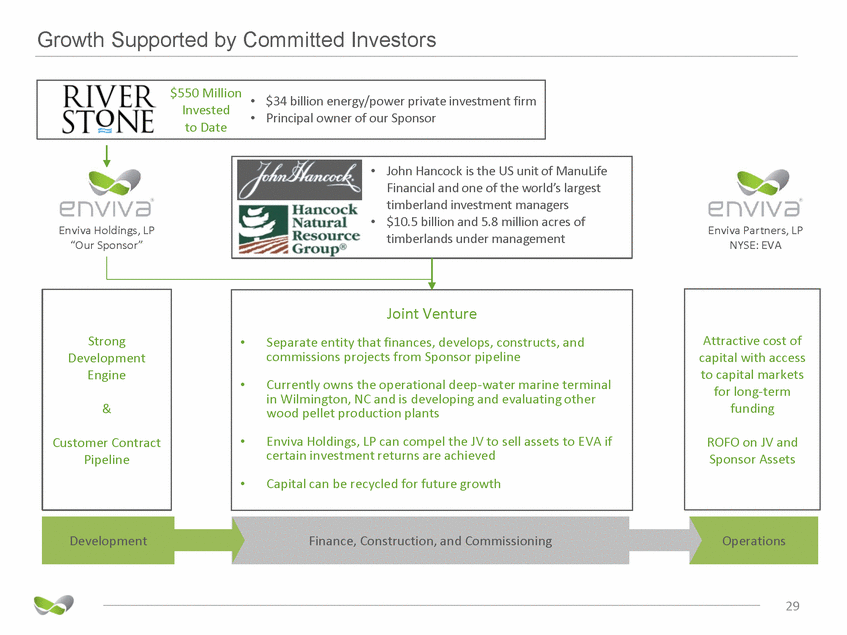
High Caliber Leadership BP Williams John Bumgarner Director (Independent) John Keppler Chairman & CEO Bill Reilly Director (Independent) Steve Reeves EVP & CFO Gary Whitlock Director (Independent) EPA Exxon Thomas Meth EVP of Sales & Marketing Janet Wong Director (Independent) Buckeye Black & Decker Bill Schmidt EVP & General Counsel Ralph Alexander Director Robin Duggan Director Royal Smith EVP of Operations CenterPoint KPMG Michael Hoffman Director Jim Geraghty VP & Controller Chris Hunt Director Ray Kaszuba VP & Treasurer GM Plum Creek Carl Williams Director 30 Directors Management Management and Board with Significant Industry Experience
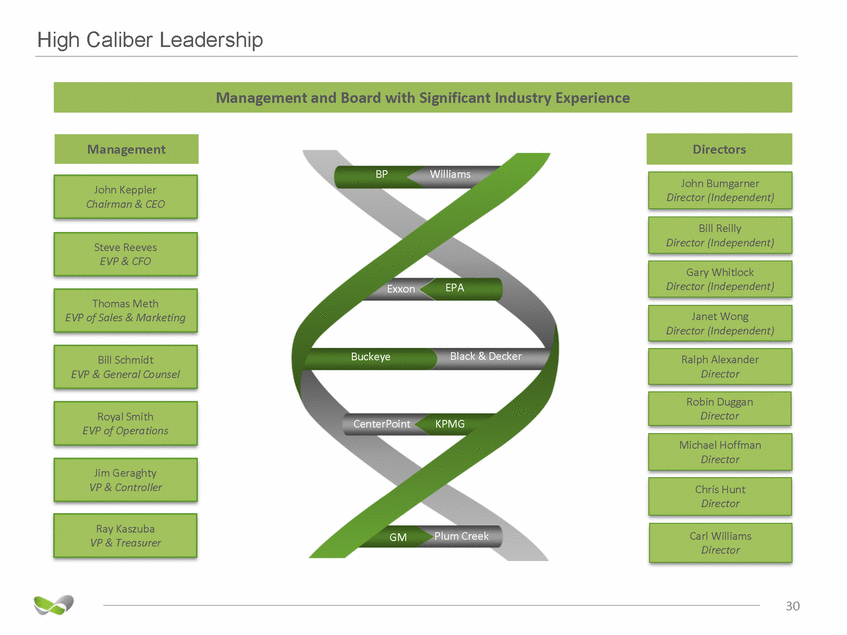
Financial Information & Reg G Reconciliations
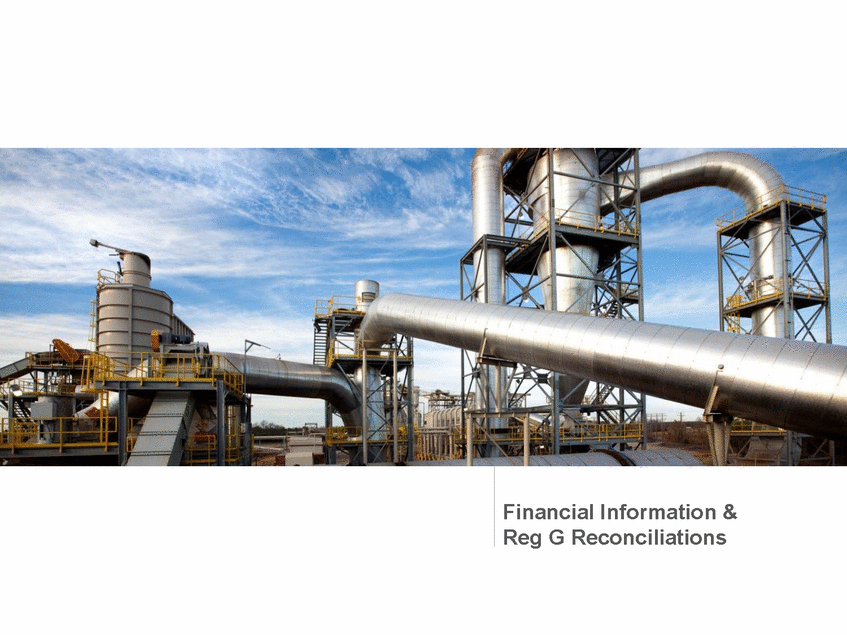
Annual Financial Information ENVIVA PARTNERS, LP AND SUBSIDIARIES CONSOLIDATED STATEMENTS OF OPERATIONS (In thousands, except per unit amounts) See Note 1 of our financial statements, Business and Basis of Presentation, to our 2016 Annual Report on Form 10-K (the “10-K”) and slide 34 for basis of presentation. 32 Year Ended December 31, 2016 2015 2014 (Predecessor) (Recast) (Recast) Product sales $444,489 $450,980 $286,641 Other revenue 19,787 6,394 3,495 Net revenue 464,276 457,374 290,136 Cost of goods sold, excluding depreciation and amortization 357,209 365,061 251,058 Depreciation and amortization 27,694 30,692 18,971 Total cost of goods sold 384,903 395,753 270,029 Gross margin 79,373 61,621 20,107 General and administrative expenses 29,054 22,027 14,368 Impairment of assets held for sale 9,991 — — Loss on disposal of assets 2,386 2,081 340 Income from operations 37,942 37,513 5,399 Other income (expense): Interest expense (15,642) (10,556) (8,724) Related-party interest expense (578) (1,154) — Early retirement of debt obligation (4,438) (4,699) (73) Other income 439 979 22 Total other expense, net (20,219) (15,430) (8,775) Income (loss) before tax expense 17,723 22,083 (3,376) Income tax expense — 2,623 15 Net income (loss) 17,723 19,460 (3,391) Less net loss attributable to noncontrolling partners’ interests 3,654 1,899 215 Net income attributable to Enviva Partners, LP $21,377 $21,359 $(3,176) Less: Predecessor loss to May 4, 2015 (prior to IPO) $— $(2,132) $264 Less: Pre-acquisition income from April 10, 2015 to December 10, 2015 from operations of Enviva Pellets Southampton Drop-Down allocated to General Partner — 6,264 — Less: Pre-acquisition income from inception to December 13, 2016 from operations of Enviva Pellets Sampson Drop-Down allocated to General Partner (3,231) (1,815) (3,440) Enviva Partners, LP partners’ interest in net income $24,608 $19,042 $— Net income per common unit: Basic $ 0.95 $ 0.80 — Diluted $ 0.91 $ 0.79 — Net income per subordinated unit: Basic $ 0.93 $ 0.80 — Diluted $ 0.93 $ 0.79 — Weighted average number of limited partner units outstanding: Common – basic 13,002 11,988 — Common – diluted 13,559 12,258 — Subordinated – basic and diluted 11,905 11,905 — Distribution declared per limited partner unit for respective periods $2.10 $1.1630 —
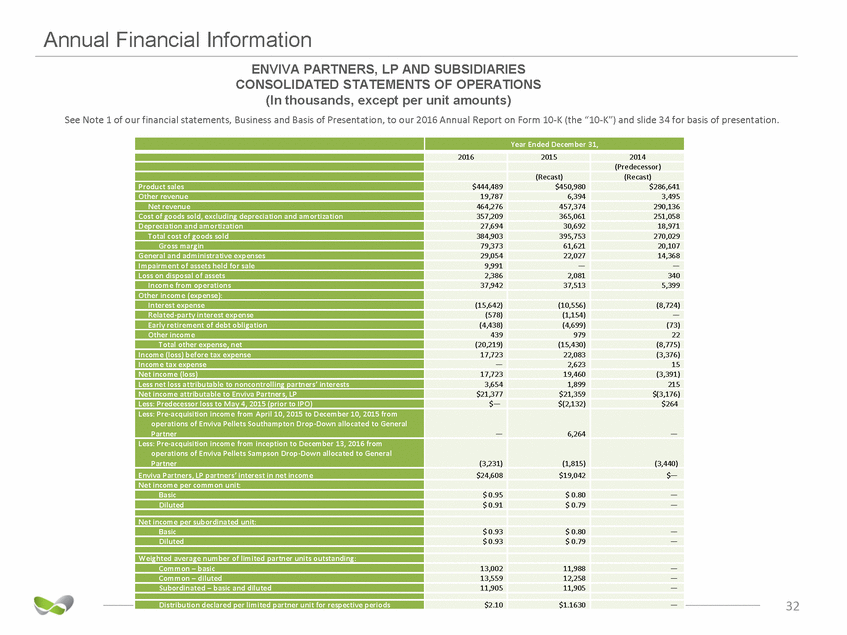
Quarterly Financial Information ENVIVA PARTNERS, LP AND SUBSIDIARIES CONDENSED CONSOLIDATED STATEMENTS OF OPERATIONS (In thousands, except per unit amounts) See Note 1 of our financial statements, Business and Basis of Presentation, to our 2016 Annual Report on Form 10-K (the “10-K”) and slide 34 for basis of presentation. The quarterly information below has been recast accordingly. 33 Three Months Ended March 31, 2017 December 31, 2016 September 30, 2016 June 30, 2016 March 31, 2016 (Recast) (Recast) (Recast) Product sales $119,047 $121,220 $103,577 $116,247 $103,445 Other revenue 3,076 5,301 7,217 3,462 3,807 Net revenue 122,123 126,521 110,794 119,709 107,252 Cost of goods sold, excluding depreciation and amortization 95,215 99,190 80,420 92,983 84,616 Depreciation and amortization 8,432 7,265 6,434 7,114 6,881 Total cost of goods sold 103,647 106,455 86,854 100,097 91,497 Gross margin 18,476 20,066 23,940 19,612 15,755 General and administrative expenses 8,301 7,029 8,707 6,369 6,949 Impairment of assets held for sale — 9,991 — — — Loss on disposal of assets 24 707 1,524 154 1 Income from operations 10,151 2,339 13,709 13,089 8,805 Other income (expense): Interest expense (7,705) (6,107) (3,314) (3,039) (3,182) Related-party interest expense — (17) (51) (301) (209) Early retirement of debt obligation — (4,438) — — — Other income 56 165 2 140 132 Total other expense, net (7,649) (10,397) (3,363) (3,200) (3,259) Net income (loss) 2,502 (8,058) 10,346 9,889 5,546 Less net loss attributable to noncontrolling partners’ interests 33 187 1,366 1,108 993 Net income (loss) attributable to Enviva Partners, LP $2,535 $(7,871) $11,712 $10,997 $5,847 Less: Pre-acquisition income (loss) from inception to December 13, 2016 from operations of Enviva Pellets Sampson Drop-Down allocated to General Partner $— $101 $(1,321) $(1,056) $(1,647) Enviva Partners, LP partners’ interest in net income (loss) $2,535 $(7,972) $13,033 $12,053 $7,494 Net income (loss) per common unit: Basic $ 0.08 $(0.34) $ 0.51 $ 0.48 $ 0.30 Diluted $0.07 $(0.34) $ 0.50 $ 0.47 $ 0.29 Net income (loss) per subordinated unit: Basic $0.08 $(0.32) $0.51 $0.48 $0.30 Diluted $0.08 $(0.32) $ 0.50 $ 0.47 $ 0.29 Weighted average number of limited partner units outstanding: Common – basic 14,380 13,372 12,919 12,862 12,852 Common – diluted 15,228 13,372 13,480 13,445 13,337 Subordinated – basic and diluted 11,905 11,905 11,905 11,905 11,905
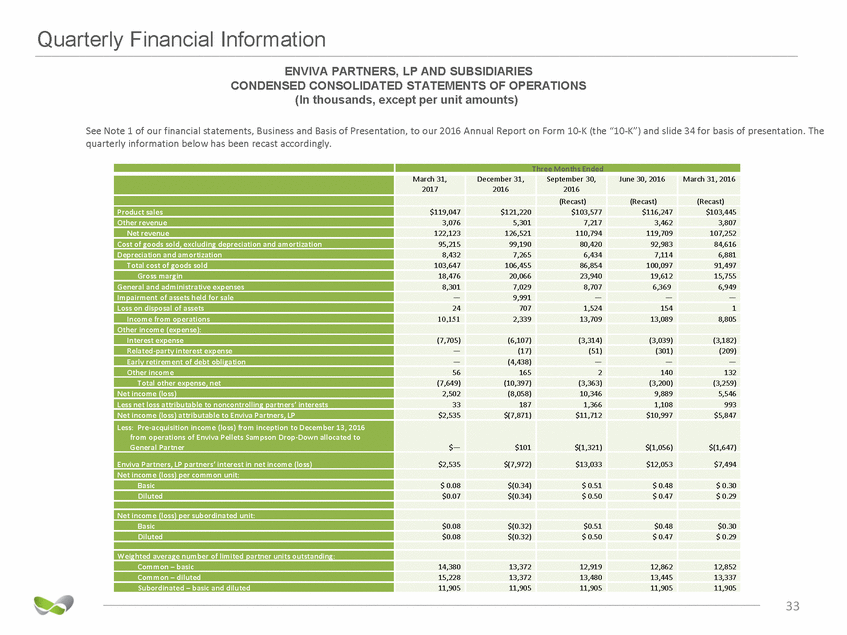
Non-GAAP Financial Measures We provide results that exclude the results of the Sampson Drop-Down for the periods prior to the Sampson acquisition date of December 14, 2016. These illustrative presentations are not presented in accordance with GAAP and should not be considered alternatives to the presentation of the recast financial results of the Partnership. Management views these presentations as important to reflect the Partnership’s actual performance during 2016, including as measured against our published guidance for 2016, which did not include the impact of acquisitions. Non-GAAP Financial Measures We use adjusted gross margin per metric ton, adjusted EBITDA and distributable cash flow to measure our financial performance. Adjusted Gross Margin per Metric Ton We define adjusted gross margin as gross margin excluding depreciation and amortization included in cost of goods sold. We believe adjusted gross margin per metric ton is a meaningful measure because it compares our revenue-generating activities to our operating costs for a view of profitability and performance on a per metric ton basis. Adjusted gross margin per metric ton will primarily be affected by our ability to meet targeted production volumes and to control direct and indirect costs associated with procurement and delivery of wood fiber to our production plants and the production and distribution of wood pellets. Adjusted EBITDA We define adjusted EBITDA as net income or loss excluding depreciation and amortization, interest expense, income tax expense, early retirement of debt obligations, non-cash unit compensation expense, asset impairments and disposals, and certain other items of income or loss that we characterize as unrepresentative of our ongoing operations. Adjusted EBITDA is a supplemental measure used by our management and other users of our financial statements, such as investors, commercial banks, and research analysts, to assess the financial performance of our assets without regard to financing methods or capital structure. Distributable Cash Flow We define distributable cash flow as adjusted EBITDA less maintenance capital expenditures and interest expense net of amortization of debt issuance costs and original issue discounts. We use distributable cash flow as a performance metric to compare cash-generating performance of the Partnership from period to period and to compare the cash-generating performance for specific periods to the cash distributions (if any) that are expected to be paid to our unitholders. We do not rely on distributable cash flow as a liquidity measure. Adjusted gross margin per metric ton, adjusted EBITDA and distributable cash flow are not financial measures presented in accordance with accounting principles generally accepted in the United States (“GAAP”). We believe that the presentation of these non-GAAP financial measures provides useful information to investors in assessing our financial condition and results of operations. Our non-GAAP financial measures should not be considered as alternatives to the most directly comparable GAAP financial measures. Each of these non-GAAP financial measures has important limitations as an analytical tool because they exclude some, but not all, items that affect the most directly comparable GAAP financial measures. You should not consider adjusted gross margin per metric ton, adjusted EBITDA or distributable cash flow in isolation or as substitutes for analysis of our results as reported under GAAP. Our definitions of these non-GAAP financial measures may not be comparable to similarly titled measures of other companies, thereby diminishing their utility. 34
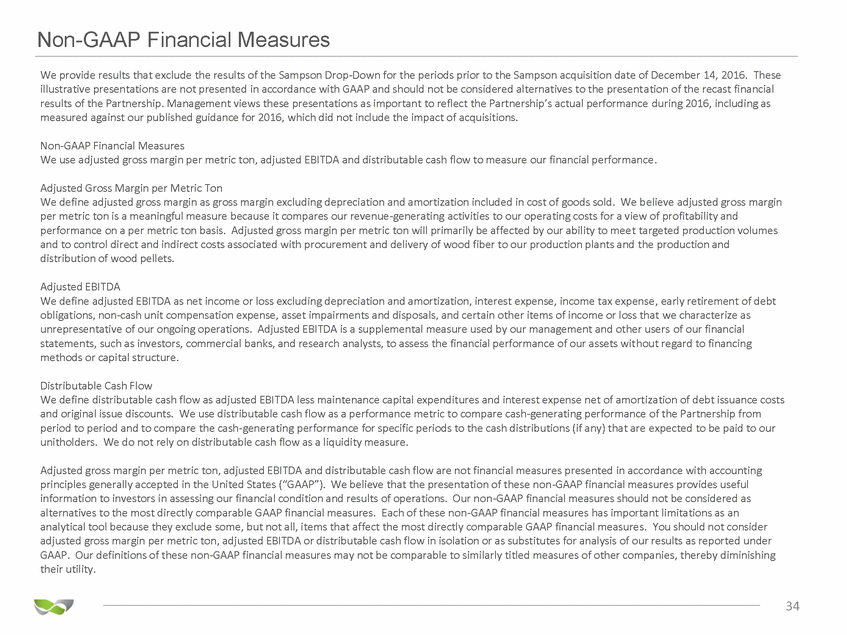
Non-GAAP Financial Measures Reconciliation The following (loss): table provides a reconciliation of distributable cash flow and adjusted EBITDA to net income 35 Year Ended December 31, 2016 2015 2014 (Predecessor) (Recast) (Recast) (in thousands) Reconciliation of distributable cash flow and adjusted EBITDA to net income (loss): Net income (loss) $17,723 $19,460 $(3,391) Add: Depreciation and amortization 27,722 30,738 19,009 Interest expense 16,220 11,710 8,724 Early retirement of debt obligation 4,438 4,699 73 Purchase accounting adjustment to inventory — 697 — Non-cash unit compensation expense 4,230 704 2 Income tax expense — 2,623 15 Asset impairments and disposals 12,377 2,081 340 Transaction expenses 827 893 — Adjusted EBITDA $83,537 $73,605 $24,772 Less: Interest expense net of amortization of debt issuance costs and original issue discount 15,625 10,104 6,703 Maintenance capital expenditures 5,187 4,359 515 Distributable cash flow attributable to Enviva Partners, LP $62,725 $59,142 $17,554 Less: Distributable cash flow attributable to incentive distribution rights 1,077 — — Distributable cash flow attributable to Enviva Partners, LP limited partners $61,648 $59,142 $17,554
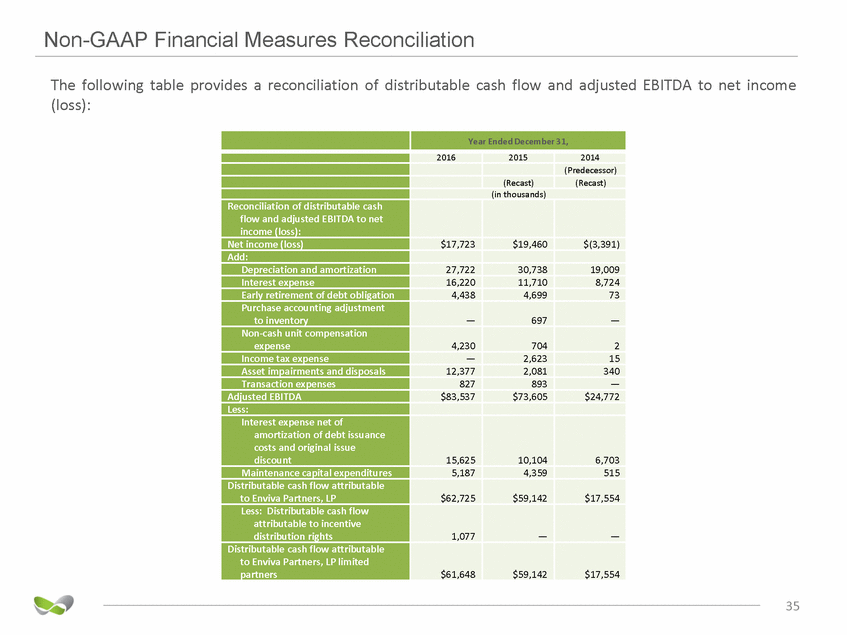
Non-GAAP Financial Measures Reconciliation (Cont.) The following table provides a reconciliation of distributable cash flow and adjusted EBITDA (loss): to net income See Note 1 of our financial statements, Business and Basis of Presentation, to our 2016 Annual Report on Form 10-K (the “10-K”) and slide 34 for basis of presentation. The quarterly information below has been recast accordingly. 36 Three Months Ended March 31, 2017 December 31, 2016 September 30, 2016 June 30, 2016 March 31, 2016 (Recast) (Recast) (Recast) (in thousands) Reconciliation of distributable cash flow and adjusted EBITDA to net (loss) income: Net income (loss) $2,502 $(8,058) $10,346 $9,889 $5,546 Add: Depreciation and amortization 8,436 7,270 6,439 7,120 6,893 Interest expense 7,705 6,124 3,365 3,340 3,391 Early retirement of debt obligation — 4,438 — — — Non-cash unit compensation expense 1,714 1,569 1,161 819 681 Income tax (benefit) expense — — — — — Asset impairments and disposals 24 10,698 1,523 155 1 Transaction expenses 2,533 719 49 6 53 Adjusted EBITDA $22,914 $22,760 $22,883 $21,329 $16,565 Less: Interest expense net of amortization of debt issuance costs and original issue discounts 7,324 6,867 2,919 2,894 2,945 Maintenance capital expenditures 452 2,429 1,375 832 551 Distributable cash flow attributable to Enviva Partners, LP $15,138 $13,464 $18,589 $17,603 $13,069 Less: Distributable cash flow attributable to incentive distribution rights 537 361 303 257 156 Distributable cash flow attributable to Enviva Partners, LP limited partners $14,601 $13,103 $18,286 $17,346 $12,913
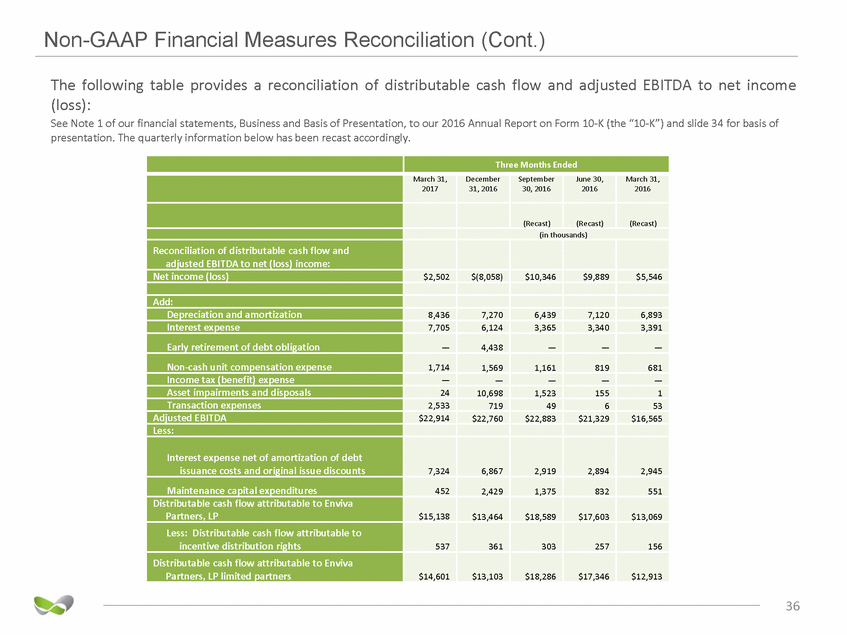
Non-GAAP Financial Measures Reconciliation (Cont.) The following table provides a reconciliation of adjusted gross margin per metric ton: See Note 1 of our financial statements, Business and Basis of Presentation, to our 2016 Annual Report on Form 10-K (the “10-K”) and slide 34 for basis of presentation. The quarterly information below has been recast accordingly. 37 Three Months Ended Twelve Months Ended March 31, 2017 December 31, 2016 September 30, 2016 June 30, 2016 March 31, 2016 December 31, 2016 December 31, 2015 December 31, 2014 (Recast) (Recast) (Recast) (Recast) (Recast) (in thousands, except per metric ton) (in thousands, except per metric ton) Reconciliation of gross margin to adjusted gross margin per metric ton: Metric tons sold 623 632 534 620 560 2,346 2,374 1,508 Gross Margin $18,476 $20,066 $23,940 $19,612 $15,755 $79,373 $61,621 $20,107 Depreciation and amortization 8,432 7,265 6,434 7,114 6,881 27,694 30,692 18,971 Adjusted gross margin $26,908 $27,331 $30,374 $26,726 $22,636 $107,067 $92,313 $39,078 Adjusted gross margin per metric ton $43.19 $43.25 $56.88 $43.11 $40.42 $45.64 $38.89 $25.91
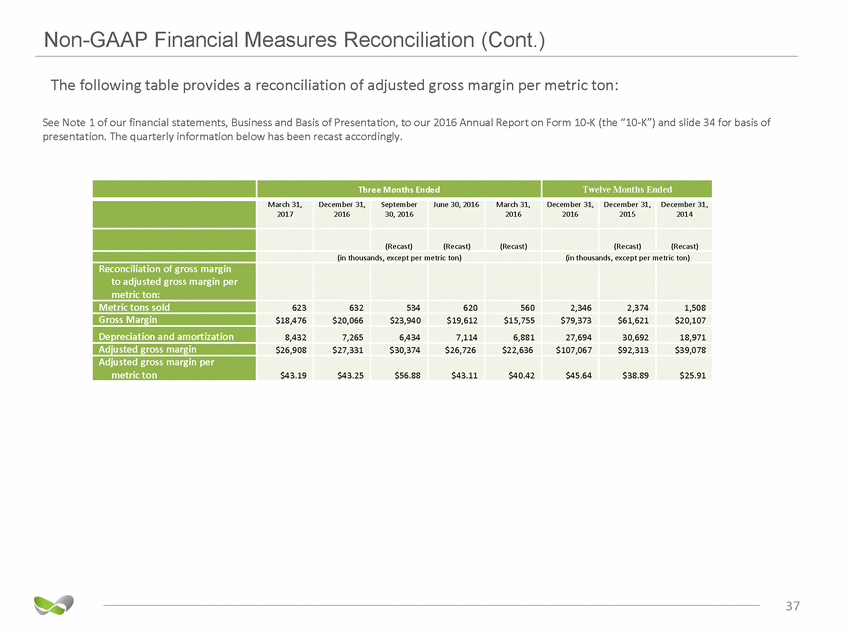
Non-GAAP Financial Measures Reconciliation (Cont.) The following table presents, in each case for the three months ended and the year ended December 31, 2016, a reconciliation of adjusted EBITDA and distributable cash flow, each excluding the results of the Sampson Drop-Down for the period prior to the Acquisition Date, to the most directly comparable GAAP financial measures, as applicable, for each of the periods indicated: See Note 1 of our financial statements, Business and Basis of Presentation, to our 2016 Annual Report on Form 10-K (the “10-K”) and slide 34 for basis of presentation. The quarterly information below has been recast accordingly 38 Three Months Ended Twelve Months Ended March 31, 2017 December 31, 2016 September 30, 2016 June 30, 2016 March 31, 2016 December 31, 2016 (Recast) (Recast) (Recast) (in thousands) (in thousands) Reconciliation of distributable cash flow and adjusted EBITDA to net (loss) income: Net income (loss) $2,502 $(8,058) $10,346 $9,889 $5,546 $17,723 Add: Depreciation and amortization 8,436 7,270 6,439 7,120 6,893 27,722 Interest expense 7,705 6,124 3,365 3,340 3,391 16,220 Early retirement of debt obligation — 4,438 — — — 4,438 Non-cash unit compensation expense 1,714 1,569 1,161 819 681 4,230 Asset impairments and disposals 24 10,698 1,523 155 1 12,377 Transaction expenses 2,533 719 49 6 53 827 Effect of Sampson Drop-Down recast — (544) 2,586 2,131 1,932 6,105 Adjusted EBITDA $22,914 $22,216 $25,469 $23,460 $18,497 $89,642 Less: Interest expense net of amortization of debt issuance costs and original issue discount 7,324 6,857 2,919 2,894 2,945 15,614 Maintenance capital expenditures 452 2,429 1,375 832 551 5,187 Distributable cash flow attributable to Enviva Partners, LP $15,138 $12,930 $21,175 $19,734 $15,002 $68,841 Less: Distributable cash flow attributable to incentive distribution rights 537 361 303 257 156 1,077 Distributable cash flow attributable to Enviva Partners, LP limited partners $14,601 $12,569 $20,872 $19,477 $14,846 $67,764
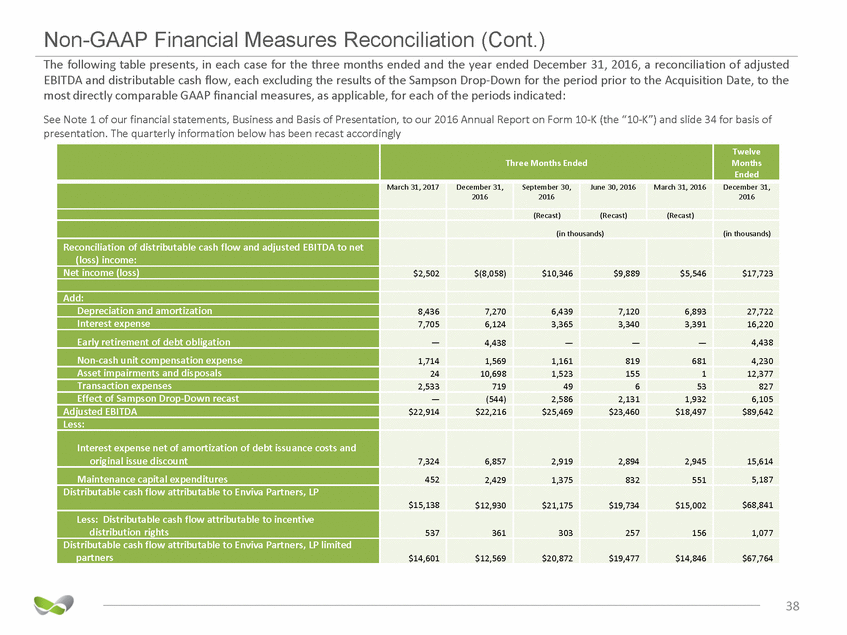
Non-GAAP Financial Measures Reconciliation (Cont.) The following table provides a reconciliation of the estimated range of distributable cash flow and adjusted EBITDA to the estimated range of net income. Guidance was provided on May 10, 2017: The following table provides a reconciliation of the estimated range of adjusted EBITDA to the estimated range of net income. Guidance was provided on and as of November 3, 2016, and affirmed on February 23, 2017: (1) Prior to any distributions paid to our general partner 39 Twelve Months Ending December 31, 2017 Estimated net income (loss) $31.0 – 35.0 Add: Depreciation and amortization 34.5 Interest expense 31.3 Non-cash unit compensation expense 6.6 Asset impairments and disposals 4.0 Acquisition transaction expenses - Early retirement of debt obligations 2.6 Estimated adjusted EBITDA $110.0 – 114.0 Twelve Months Ending December 31, 2017 Estimated net income $29.0 – 33.0 Add: Depreciation and amortization 37.0 Interest expense 31.4 Non-cash unit compensation expense 6.6 Asset impairments and disposals 4.0 Transaction expenses 3.0 Estimated adjusted EBITDA $111.0 – 115.0 Less: Interest expense net of amortization of debt issuance costs and original issue discounts 29.7 Maintenance capital expenditures 5.1 Estimated distributable cash flow1 $76.2 – 80.2
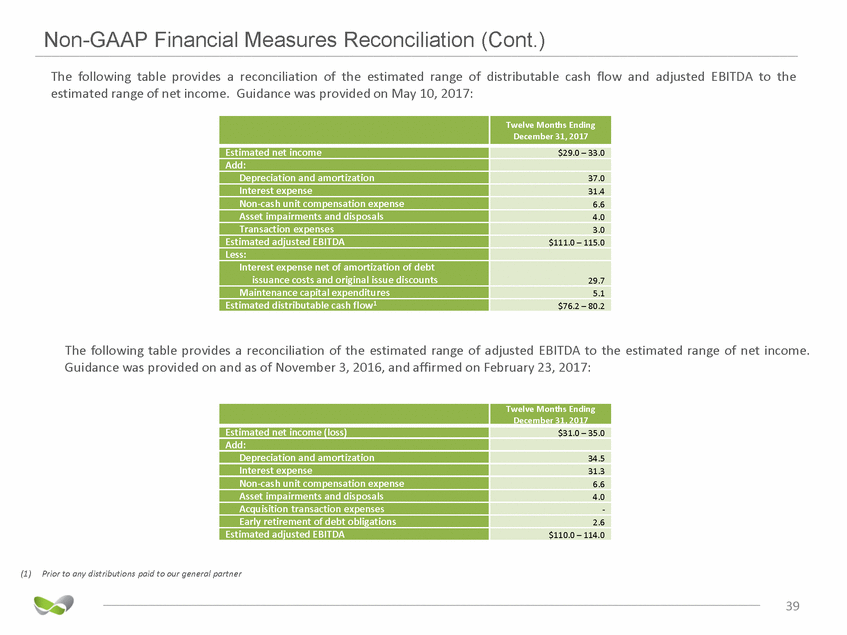
Non-GAAP Financial Measures Reconciliation (Cont.) The following table provides a reconciliation of estimated adjusted EBITDA to estimated net (loss) income, in each case for the twelve months ending December 31, Wilmington terminal and related contracts (in millions): 2018 and December 31, 2019, associated with the 40 Twelve Months Ending December 31, 2018 Twelve Months Ending December 31, 2019 Estimated net (loss) income $(2.1) $0.9 Add: Depreciation and amortization 4.3 4.3 Interest expense 2.8 2.8 Estimated adjusted EBITDA $5.0 $8.0
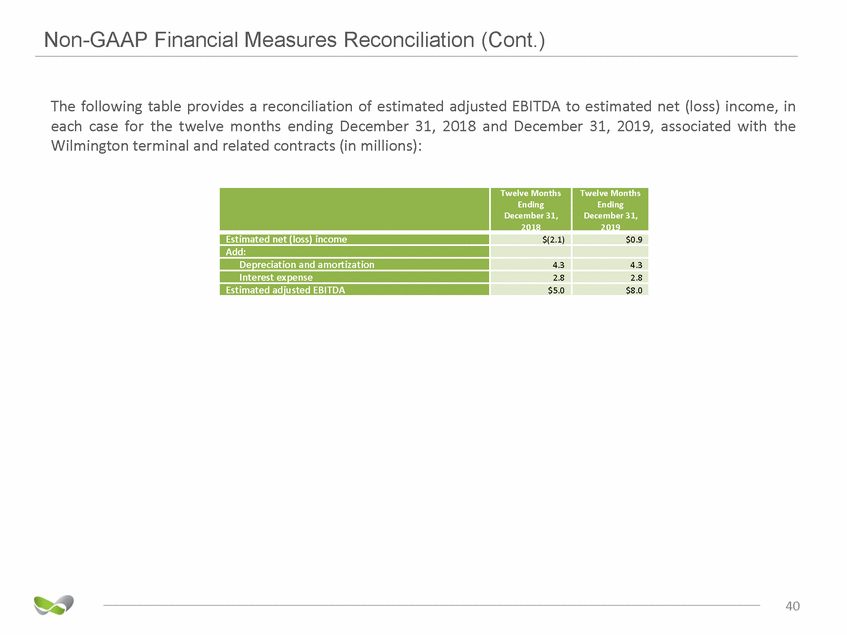
Non-GAAP Financial Measures Reconciliation (Cont.) Our sponsor’s estimates of incremental adjusted EBITDA for the Wilmington terminal and the Hamlet plant are based on numerous assumptions that are subject to significant risks and uncertainties. The assumptions underlying our sponsor’s estimates of incremental adjusted EBITDA generated by certain of its assets are inherently uncertain and subject to significant business, economic, financial, regulatory, and competitive risks and uncertainties that could cause actual results and amounts to differ materially from those estimates. For more information about such significant risks and uncertainties, please see the risk factors discussed or referenced in our filings with the Securities and Exchange Commission (the “SEC”), including the Annual Report on Form 10-K and the Quarterly Reports on Form 10-Q most recently filed with the SEC. A reconciliation of Wilmington’s estimated incremental adjusted EBITDA to account for anticipated throughput from the Hamlet plant to the closest GAAP financial measure is not provided because GAAP net income generated by the Wilmington terminal is not available without unreasonable effort, in part because the amount of estimated incremental interest expense related to the financing of the additional payment due upon first deliveries from the Hamlet plant is not available at this time. A reconciliation of the Hamlet plant’s estimated incremental adjusted EBITDA to the closest GAAP financial measure is not provided because GAAP net income generated by the Hamlet plant is not available without unreasonable effort. The amount of interest expense and the amount of depreciation and amortization expense with respect to the Hamlet plant is not available at this time. 41
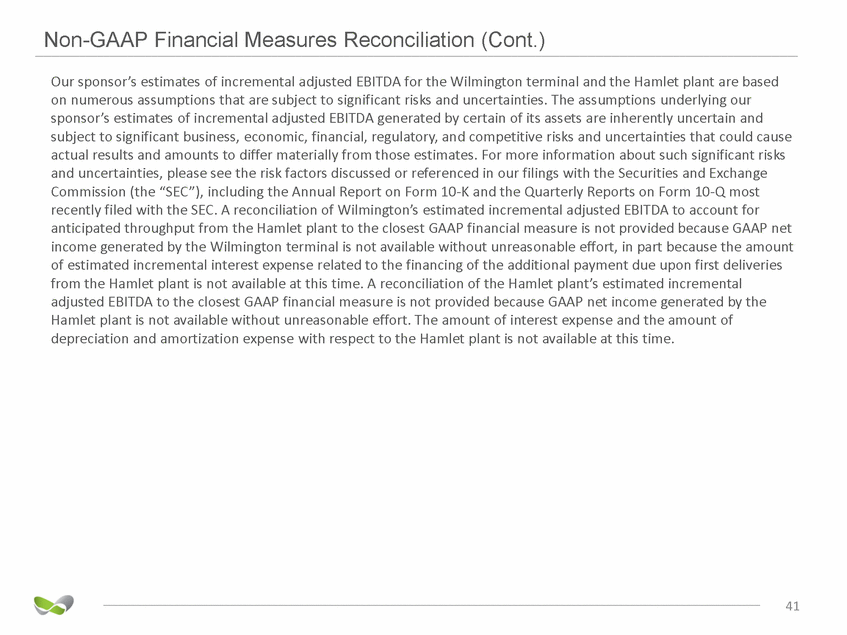
env1va Contact: Ray Kaszuba Vice President and Treasurer +1240-482-3856 ir@envivapartners.com
